nnual 20 22a


nnual 20 22a

SolidarityNow is a Greek non-profit, humanitarian organisation founded in 2013, to respond to the needs and uphold the rights, of the most vulnerable and marginalised groups of our society, indiscriminately.
Our vision is to improve people’s lives and empower them to create a just and inclusive society.
SolidarityNow has supported more than 350.000 people to date, through direct implementation and grants to strengthen the work of civil society.
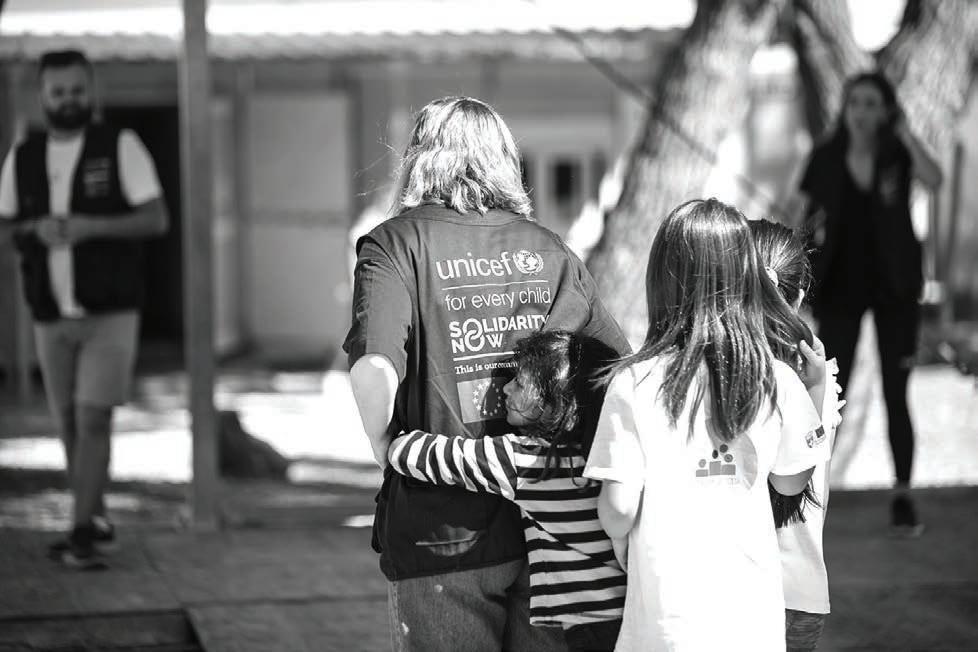
We strive to:
Ensure that people are safe and have access to vital resources and services
Encourage people to realize their potential for long term economic well-being and selfreliance
Empower people to be aware of their rights to make decisions that affect their lives
Enable the strengthening and independence of Greek Civil Society by defending open society values
Our vision becomes practice through the following programmatic priorities
Integration, empowerment and social inclusion
Education and life skills
Safety, protection and defending human rights
The journey continues until we realize this shared aspiration.
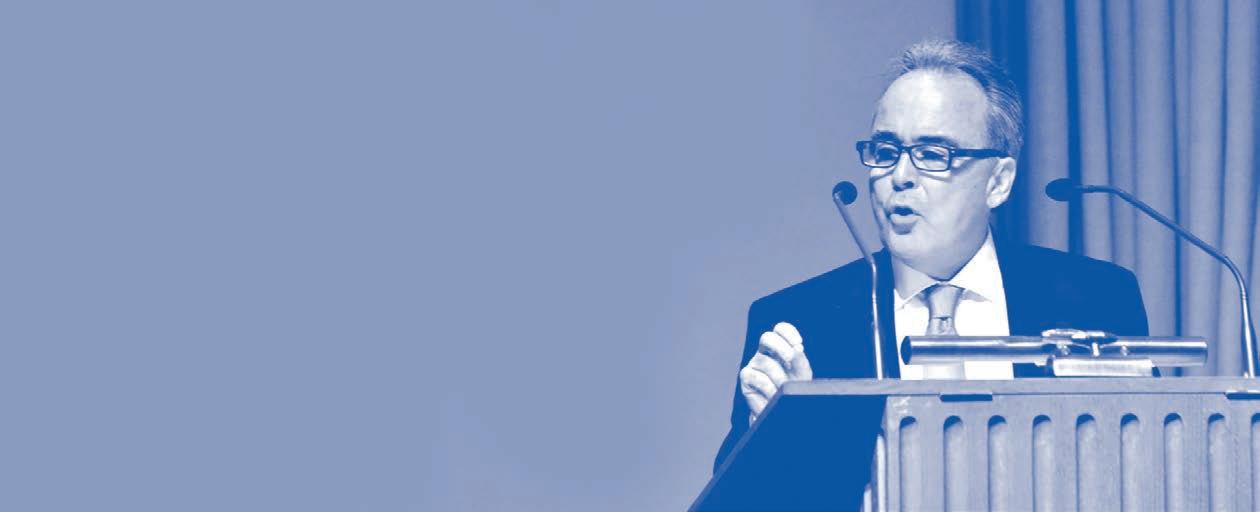 Stelios Zavvos
Chairman of the Board of Directors
Stelios Zavvos
Chairman of the Board of Directors
In 2022, Europe underwent significant transformations, mirroring global shifts. Amidst the ongoing recovery from the economic and health repercussions of the Covid-19 pandemic, the year unfolded against the backdrop of the conflict in Ukraine. It became a pivotal time, necessitating the defense of democratic values in the face of geopolitical challenges along with the ever-increasing impact of the climate crisis.
Russia’s invasion of Ukraine February 2022 marked an undeniable and historic turning point for Europe. The Russian invasion posed a threat not only to Ukraine itself but also to democratic institutions and security worldwide. This incursion not only posed a direct threat to Ukraine but also to democratic principles and global security. The long-term ramifications of this war remain unclear, but its immediate impact has been felt through the mass exodus of over 6 million Ukrainians, predominantly women and children,
seeking refuge in neighboring countries. In response to the grim reality of war, the Member States of the Union demonstrated unity by supporting Ukraine’s defense of its sovereign territory. They imposed sanctions on Russia and conferred candidate membership upon Ukraine. Concurrently, the activation of the Temporary Protection Directive, a measure in place since its adoption in 2001, facilitated the immediate provision of temporary protection for millions of refugees seeking shelter within the EU. In Greece we have so far received almost 80,000 Ukrainian refugees. SolidarityNow has been at the forefront of the response, providing assistance to newly arrived refugees.
Adding to the challenges of 2022, a pronounced energy and economic crisis unfolded, characterized by swiftly escalating prices attributed to the further deterioration of supply chains - a predicament initiated
during the Covid-19 pandemic. This crisis not only intensified economic inequalities but also heightened the pervasive sense of insecurity felt globally. The escalation of global instability was further underscored by the proliferation of armed conflicts. Amid these multifaceted crises, humanitarian challenges persisted unabated. The crises in Syria, Afghanistan, South Sudan, and Yemen remained dire, with no discernible signs of resolution.
Following a substantial decline during the pandemic, the influx of refugees and migrants into the European Union exhibited an upswing in 2022, with Syria, Egypt, and Tunisia emerging as the primary countries of origin. This surge was mirrored in asylum applications, which reached 966,000 across all Member States—twice the figure recorded in 2021 and the highest since 2016. Greece, ranking second after Italy, found itself once again at the forefront of refugee and migrant arrivals within the EU this year. As arrivals increased, so did the challenges associated with reception and integration. Focused on supporting and empowering children, our presence extended to 15 sites on the mainland, supporting thousands of children. Simultaneously, a rise in xenophobia across Europe coincided with an escalating demand for unskilled workers in specific sectors, notably agriculture. Consequently, the imperative to initiate discussions on expanding legal migration routes became increasingly apparent. SolidarityNow has actively engaged in ongoing dialogues with national and EU institutions, advocating for improvements in protection and inclusion measures.
In 2022, the concerning global trend of diminishing democratic institutions persisted. The challenges surrounding the rule of law remained a prominent topic on the European agenda. Within this framework, both the European Union and national governments grappled with the critical task of confronting demo-
cratic backsliding and the rise of illiberal democracies, exemplified by situations in countries like Poland and Hungary. This backdrop has led to a questioning of fundamental European values, including freedom, democracy, and solidarity. The unity of the European bloc is now under scrutiny as these core principles face challenges and uncertainties.
This year witnessed an alarming escalation of the climate crisis, with Europe and other regions grappling with unprecedented temperatures and extreme weather events. From Pakistan, where a third of the country was submerged, to the south-western states of the USA facing severe drought, the impact of climate change reverberated globally. The UN’s Intergovernmental Panel on Climate Change sounded a warning, emphasizing the urgency of addressing the crisis before its effects become irreversible. In Greece, significant strides were made with the passage of the national climate law, charting a course towards climate neutrality by 2050. However, achieving these ambitious goals requires substantial changes.
Our commitment at SolidarityNow extends to supporting, empowering, and protecting all individuals in need, without discrimination. In every endeavor, our primary objective is to provide immediate responses and sustain the solidarity networks essential for collective well-being. SolidarityNow, alongside its dedicated team, demonstrates daily that the guiding principles of kindness and humanity endure, affirming that everyone deserves equal opportunities to shape their own conditions of well-being.
Amid the pressing challenges of our time, SolidarityNow remains at the forefront, envisioning a better world and actively working towards that vision. The journey continues until we realize this shared aspiration.
A world of solidarity, hope and tolerance, where people live in dignity and security.
 Marilyn Polena General Manager
Marilyn Polena General Manager
In 2022, a transformative journey unfolded for our society at large and SolidarityNow. The year was marked by the emergence of new challenges and new solutions, serving as a poignant reminder that collaborative efforts are pivotal in overcoming crises and enhancing the well-being of those facing the greatest hardships. Our ability to stay attuned to unfolding events and adapt to a dynamic context has emerged as one of our core competencies at SolidarityNow, enabling us to overcome adversities and prepare for the future, with resilience and drive.
In 2022, the war in Ukraine emerged as one of the most significant events, resulting in a devastating toll of lives lost and the displacement of a significant portion of the Ukrainian population. One third of Ukrainians left their homes, with 5.9 million internally displaced and 7.8 million seeking refuge across Europe. Greece witnessed an influx of over 76,000 Ukrainians, with 21,700 receiving temporary protection status. In response to this humanitarian crisis, SolidarityNow undertook targeted initiatives and expanded existing programs to provide support to this new demographic, facilitating their integration and ensuring their protection.
Fuelled by the war and the disruption of supply chains, global prices experienced a surge in 2022, leading to an average inflation rate of 9.3% in Greece, driven by significant increases in energy and food costs. Despite unemployment dipping from 14.7% (in 2021) to 12.2%, the deteriorating financial landscape is estimated to leave an alarming 26% of the Greek population at risk of poverty and exclusion. As the Solidarity Centers in Athens and Thessaloniki resumed in-person services after the pandemic hiatus, support continued to be provided to those most affected. Efforts aimed to facilitate access to social and protection services, enable individuals to uphold their rights, and join the labour market.
Arrivals of asylum seekers to Greece doubled in 2022, following a substantial decline over the previous years. Unfortunately, the number of those dead or missing, while trying to enter the country, also saw a significant increase during the year. In supporting asylum seekers and refugees, SolidarityNow has focused efforts on accessing education, ensuring protection, and supporting their empowerment, with programmes in urban centers and accommodation sites throughout the mainland. Bringing forward experience gained over the years, SN has developed a comprehensive approach, with holistic interventions, responding to the particular needs of each individual.
2022 marked the closure of our last accommodation programme for unaccompanied minors. Going forward SolidarityNow will focus on service provision coupled with advocacy actions to support policy change and an improved legislative framework, particularly for those turning 18. This year a unique programme was initiated, in collaboration with the Council of Europe and national and international counterparts, aiming to support unaccompanied
minors as they transition to adulthood. SolidarityNow held several activities and events bringing this reality to the foreground providing a valuable forum for young people to share their concerns, challenges, and proposals.
This year, we have also seen climate change take its place in our daily lives, manifesting itself through extreme weather events and record heat waves that swept across Europe, diminishing crop yields, and leaving burnt forests and dried up rivers in its wake. This has severely affected local populations and further increased what is now identifiable as climate migration and the displacement of communities. In the face of these challenges, SN remains committed to ongoing efforts aimed at supporting those adversely affected by climate change. Moreover, we are dedicated to sowing the seeds for the widespread adoption of environmentally friendly practices across our operations.
In 2022 SolidarityNow developed its strategy for 2023-2025 delineating four programmatic priorities: a) inclusive education for all, b) catalysing livelihoods opportunities, c) enhancing social protection and cohesion, and d) enabling access to justice and the protection of human rights. This comprehensive strategy will serve as the guiding framework for all programmes and activities undertaken by the organization in the forthcoming years.
SolidarityNow has been at the forefront of all these changes, acting as a damper for societal needs while supporting people in need, throughout the country.
As a ship through stormy waters, we continue to navigate through changes and challenges, in pursuit of our vision, “A world of solidarity, hope and tolerance, where people live in dignity and security”.
National
Active Citizens Fund Greece
Partner: BODOSSAKI FOUNDATION
Donor: EEA GRANTS
ENACTED (European Network of Active Civil Society for Education & Diversity)
Donor: EU/ERASMUS+
UAC FUTURES
Donors: EU/AMIF and Council of Europe
Presence in open accommodation sites
Andravida, Malakasa, Ritsona, Thermopylae, Thiva, Vagiochori, Drama, Serres, Polykastro, Kavala, Kato Milia, Kleidi, Oinofyta, Koutsohero, Volos, Diavata, Korinthos
All Children in Education (ACE)
Donor: UNICEF/EU
Andravida, Drama, Kavala, Kato
Milia, Kleidi, Polykastro, Malakasa, Oinofyta, Ritsona, Serres, Thermopylae, Thiva, Vagiochori
Provision of legal aid and representation, HARP program
Donor: IOM / EU
Drama, Kavala, Koutsohero, Ritsona, Serres, Thermopylae, Thiva, Volos
Provision of labor market orientation, HARP program
Donor: IOM / EU
Malakasa, Oinofita, Ritsona, Drama, Kavala, Serres, Vagiochori, Polykastro, Diavata
Operation of Female Friendly Spaces (FFS), HARP program
Donor: IOM / EU
Andravida, Thiva, Malakasa, Oinofyta, Ritsona, Korinthos, Drama, Kavala, Serres, Vagiochori, Polykastro, Diavata
Thessaloniki
Blue Refugee Center
Donors: UNICEF, FOCUS, ISRAAID GLOBAL, ISRAAID GERMANY
All Children in Education (ACE)
Donor: UNICEF/EU
Integration Learning Center (ILC)
Donor: IOM/EU
Empower YOUth, Active Citizens Fund Greece
Partner: NorSensus Media Forum
Donor: EEA GRANTS
Step by Step: Supported apartments for Unaccompanied Minors aged 16+
Donors: Asylum, Migration and Integration Fund (AMIF), ISRAAID GERMANY
Education/School Support
Partner/Donor: MAJOR DEVELOPMENT
AGENCY THESSALONIKI (MDAT)
MAMA Postnatal Care & Support
Partner/Donor: MAJOR DEVELOPMENT
AGENCY THESSALONIKI (MDAT)
Interventions to support Roma communities
Donor: OSF/OSIFE
STARTnow
Partner/Donor: STAR UK
+Tech IT
Partner/Donor: MAJOR DEVELOPMENT
AGENCY THESSALONIKI (MDAT)
Ioannina
Integration Learning Center (ILC)
Donor: IOM/EU
All Children in Education (ACE)
Donor: UNICEF/EU
Katerini & Kilkis
Integration Learning Center (ILC)
Partners: PERICHORESIS (Katerini)
OMNES (Kilkis)
Donor: IOM/EU
All Children in Education (ACE)
Donor: UNICEF/EU
Partners: OMNES (Kilkis)
Serres - Promachonas
Ukraine Child Protection (CP)
Donor: UNICEF/EU
Athens
Solidarity Center
Donors: Stavros Niarchos Foundation (SNF), Kahane Foundation, EEA Grants (with CROWE Greece and Human Righs360 as the fund operator)
Supporter: Municipality of Athens
All Children in Education (ACE)
Donor: UNICEF/EU
Integration Learning Center (ILC)
Donor: IOM/EU
Healing Play
Donor: US EMBASSY
Partner: Eugenides Foundation
Step by Step
Supported apartments for Unaccompanied Minors aged 16+
Donors: Asylum, Migration and Integration Fund (AMIF), ISRAAID GERMANY
Empower YOUth, Active Citizens Fund Greece
Partner: NorSensus Media Forum
Donor: EEA GRANTS
Beneficiaries supported: 2,122
Sessions conducted: 8,810
Annual expenses: 561,203€
Donors/Supporters: Stavros Niarchos Foundation, EEA Grants (CROWE Greece and HumanRights360 as Fund Operator), Kahane Foundation
The Athens Solidarity Center (ASC) was established in 2014 to respond to the complex issues created by the economic crisis, exacerbated by the refugee crisis and has been operating continuously since then. The ASC provides a comprehensive set of complementary services for free to all vulnerable people, indiscriminately. Specifically, the ASC supports individuals residing in and around Athens who are (or risk becoming) socially excluded, empowering them to become active and productive members of society. The Center’s holistic “one-stop-shop” approach offers knowledge and expertise across sectors, while the continuous assessment and adjustment of services ensures that it remains contextually relevant and able to respond to the current needs of the target population.
The Center offers the following services: social, legal, psychological, employability and accounting, and interpretation (in French, Arabic, Farsi/Dari, Urdu, Pashto and Ukrainian). All services operate using a holistic multidisciplinary model, which ensures that beneficiaries’ multiple and complex needs are catered to by all relevant professionals in tandem. External referrals are also made for services not provided in the Center, including medical and
psychiatric services, as well as public welfare services.
2022 marked the full return to in-person services, after the conclusion of the mixed model employed during the global pandemic. Beneficiaries came from 86 different countries, with the most popular being Pakistan (15%), Greece (13%), Afghanistan (10%), Ukraine (8%) and the Democratic Republic of the Congo, while 40% were women. There has been a notable increase in the number of undocumented individuals supported by the ASC which accounted for 26% of the total beneficiaries, as well as an increase in the number of unaccompanied minors (UAM) supported by the center.
The social service is the gateway to the Center, performing needs assessments for beneficiaries, as well as an orientation to the Center’s services.
Beyond the information provided and the cases managed through the social service, internal referrals are also made to the rest of the Center’s professionals, initiating the multidisciplinary case management scheme whenever needed.
The psychological service receives a wide range of requests, as both the local population and third
country nationals have particularly increased mental health needs, exacerbated by the pressures exerted by the complex socioeconomic circumstances in Greek society. The Center’s psychologists intervene at multiple levels, such as prevention and recovery for mental health issues, empowerment, and mobilisation of marginalised or abused individuals, so that they can address trauma and issues, become independent and improve their quality of life. Both individual and group sessions are realised.
The legal service is at the core of the Center’s functions, offering both legal consultation and representation; the latter is offered by limited actors, thus increasing its relevance. Out of all cases supported, 49% concerned refugee law, 19% immigration law, 16% civil law, 9% pension law, while the team supported 19 legal gender recognitions. The experienced team of ASC lawyers keeps abreast of the constantly shifting legal developments in legislation and judicial practice, ensuring that beneficiaries can effectively access their rights and be protected by the Greek legal framework.
The employability service targets vulnerable social groups, including refugees, migrants and
asylum seekers, the long-term unemployed, vulnerable women and single-parent families, members of the LGBTQI+ community, exprisoners, and young people with limited formal qualifications. Through individual and group sessions, the employability officers provide career guidance and counselling, combined with the development of career planning and job search skills. The aim of the service is to empower the beneficiaries and inform them about their labour rights and work culture in Greece so that they can become self-sufficient in the future. The employability officers also carry out jobs matching and follow-up once individuals are placed in jobs. Often, employability officers collaborate directly with the accounting service, focused on submitting tax declarations and providing advice and support on basic accounting issues and applying for social benefits. The accountant also provides administrative facilitation for ASC employability service beneficiaries undergoing a hiring process.
A satisfaction survey is carried out on an annual basis at the ASC to assess the impact of the services and collect feedback from beneficiaries supported. The results in 2022 indicated an overall satisfaction rate of 91% for all services.
In 2022, the ASC provided the following services:
Social Service (3,677 sessions to 1,582 beneficiaries)
Psychological Service (1,609 sessions to 137 beneficiaries)
Legal Aid (1,472 sessions and 575 legal representations to 422 beneficiaries)
Employability Service (1,306 sessions to 440 beneficiaries, out of whom 25% found employment)
Accounting Service (746 sessions to 392 beneficiaries)

Some quotes from the satisfaction survey:
A 48 y/o man from Iran with a University Degree said:
“I had a perfect experience during my visits to the Employability service. They offered multiple job opportunities. I have already been interviewed by two different employers and waiting for the result.”
Male 25y/o, Afghanistan:
“I like everything about the Athens Solidarity Center. The structure is amazing, the building is always clean and quiet. It is located in the center of Athens, easily accessible to the most vulnerable people in need. They provide a lot of different services in one building. The staff is always polite and kind.”
A 64 y/o man from Greece declared:
“As I am in the age of retirement, lacking 500 insurance stamps, I requested support from the ASC employability service. Through the support of the employability service, today I am working to complete my insurance obligations in order to get retired.”
A 25 y/o woman from Greece suggested: “SolidarityNow needs to publish its services more for more people be informed about the intervention.”
Beneficiaries supported: 1,933
Sessions conducted: 5,053
Annual expenses: 190,761€
Donors/Supporters: UNICEF, IsraAID Global, IsraAID Germany, FOCUS
ensuring comprehensive information provision and services to all beneficiaries. The social service is the first stop for beneficiaries, and it consistently assists them with various requests such as administrative needs (i.e., unemployment cards, registration of births, settling utility bills and checking eligibility of welfare support), supporting with health issues by referring to health services and following up on those cases, helping beneficiaries access higher education, or placing accommodation requests on Ministry of Migration and Asylum’s platform (DPAS). The service also ensures the steady flow of information to beneficiaries using social media platforms, voice
recordings and web applications.
Among the BRC’s features is a vibrant ChildFriendly Space, uninterruptedly operated by volunteers. During the recent increase in arrivals from the Evros border, the BRC has seen a sharp rise in spontaneous arrivals, which we support by booking appointments for them to register their asylum claims, providing NFI packages (including sleeping bags, blankets, and hygiene items) and referring them to other organizations providing food. The BRC also regularly hosts events and meetings organised by communities, and organisations as well as open interdisciplinary discussions and trainings.
The Blue Refugee Center (BRC) opened its doors in Thessaloniki in 2016. Through its continued operation over the last 6 years, the BRC has become a reference point for refugees and asylum seekers residing in the urban and peri-urban area of Thessaloniki, and has changed functions and services several times, rapidly adapting to the changing needs of the people on the ground. Consistently throughout its operation, the BRC offers a comprehensive set of services, as well as a space where beneficiaries can participate in classes and activities and spend some time in a safe and friendly environment. It must be noted that BRC has become the only “one-stop-shop” community center in Thessaloniki that brings together virtually all services needed by the target population.
In 2022, the BRC provided social services, legal counselling, employability support, school support for children, educational courses for adults, accounting services and an Internet corner. The Center combines service provision in a holistic manner, allowing beneficiaries to access several of its services at the same time through internal referrals. The BRC beneficiaries originated from 64 countries, with the most common countries of origin being Afghanistan (21%), Pakistan (8%) and Nigeria (7%); 65% of beneficiaries were male, while the majority (84%) were aged between 18 and 59.
The social service, comprised of the social workers of various programs, has supported beneficiaries on issues pertinent to said programs; however, BRC’s social service maintains a unified front,
In 2022, the BRC provided the following services:
Social Services (1,248 beneficiaries, 2,542 sessions)
Legal aid (285 beneficiaries, 1,212 sessions)
Employability services (399 beneficiaries, 896 sessions)
Non-formal Education (105 beneficiaries, 811 attending 110 sessions) Internet corner (210 beneficiaries)
Child Friendly Space (106 beneficiaries)
The impact of the BRC has been strengthened through long-standing partnerships and hosts several programs that have the BRC either as their exclusive base, or their Northern Greece base.
Throughout 2022, the BRC hosted the All Children in Education (ACE) program, providing refugee children with non-formal education services, as well as targeted social support to enable
children to enrol and remain in school. Part of the Ukrainian emergency response project was also hosted by the BRC, providing psychosocial support and activities for Ukrainian women and children. Finally, the BRC hosted the Harmonising Protection Practices in Greece (HARP) project, specifically providing office spaces for its employability component for the North.
Beneficiaries supported: 5,052
Annual expenses: 3,255,217€
Donors/Supporters: UNICEF/EU in partnership with the Ministry of Migration and Asylum
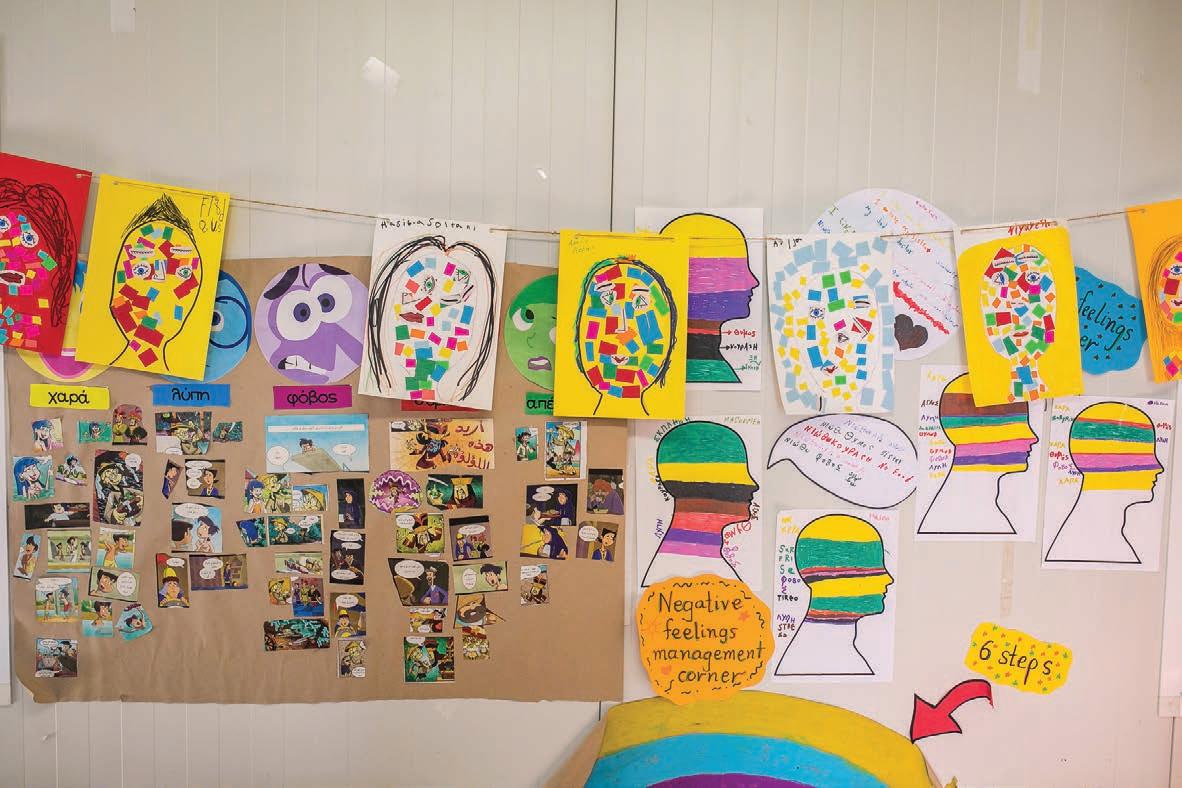
The All Children in Education (ACE) project is funded by UNICEF and implemented across Greece in partnership with the Ministry of Migration and Asylum and the Ministry of Education. Its aim is to provide non-formal education and complementary services to school-aged refugee children residing in urban centers and refugee/asylum seeker accommodation sites, ensuring all children are enrolled in school and preventing dropout. SN is among the biggest ACE partners, providing services across mainland Greece. Specifically, SN operates Homework and Creative Activities Centers (HCAC) in 3 urban centers (Athens, Thessaloniki, and Ioannina), and 13 accommodation sites (Andravida, Drama, Kavala, Kleidi, Malakasa, Nea Kavala, Oinofyta, Promachonas, Ritsona, Serres, Thermopyles, Thiva, Vagiochori). Additionally, SN leads three grantee organisations to implement their own HCACs in two additional urban locations: Greek Council for Refugees and Melissa Network are operating in Athens, and OMNES is operating in Kilkis.
The ACE project essentially continues and builds upon SN’s experience in providing nonformal education for refugee children, gathered chiefly through our long-standing partnership with UNICEF. Each HCAC provides Greek and English language lessons, as well as mathematics and science lessons, so that children are able to rapidly fill any educational gaps they may have, and be able, to follow their peers in school. A central component of the ACE project is homework support, ensuring that each child receives tailored support to complete their homework and stay on track. The teaching methodology encompasses socio-emotional learning and places an emphasis on children’s
psychosocial wellbeing inside the classroom.
The latter is accomplished with the support of the project’s social scientists and psychologists, who collaborate with teachers to implement structured psychosocial support activities. These professionals also lead the effort to support children’s enrolment in public school, partnering with local Refugee Education Coordinators; ACE teams provide students and their parents with information on school enrolment, support with administrative actions where needed, and provide practical case-by-case solutions in order to ensure that there are no barriers to accessing education. All ACE field staff are trained to identify children with specific needs in need of tailored support, through the classroom and other project activities. ACE’s social scientists and psychologists frame these children’s educational pathway; among other services, they facilitate the process for enrolling in Special Schools and receiving parallel support from the MoE, support the whole family for catering to the student’s needs, and administer external referrals when needed. Finally, another project component was providing support to regions without a HCAC (Central Macedonia, Central Greece and Epirus) to assist in refugee children’s school enrolment and organise structured PSS activities in schools.
The project’s educational expert and child rights, gender equality & parental counselling officer work towards continuously organising capacity building activities for all field staff, ensuring their methodologies are up to date and boosting their knowledge on specific issues. Peer-to-peer support is another important element of the project, combining in-person visits and online means to cultivate a community of practice on
education and psychosocial support. Additionally, children’s educational progress is monitored through the project, showcasing their achievements on a regular basis.
Overall, each component of the ACE program is geared towards taking effective action against school dropout, thus ensuring that children benefit from the universal right to education.
Schooling is also a crucial driver for the integration process, and children’s participation in education has an indirect positive effect on the whole family’s integration in Greece and in their local communities. For 2023, the project will continue providing its services to refugee children across Greece.
In 2022, the ACE project achieved the following milestones:
4,518 children enrolled in non-formal educational activities.
2,553 children provided with support to enrol in formal education.
3,415 children benefitting from structured PSS support.
666 sensitization meetings with parents/guardians held.
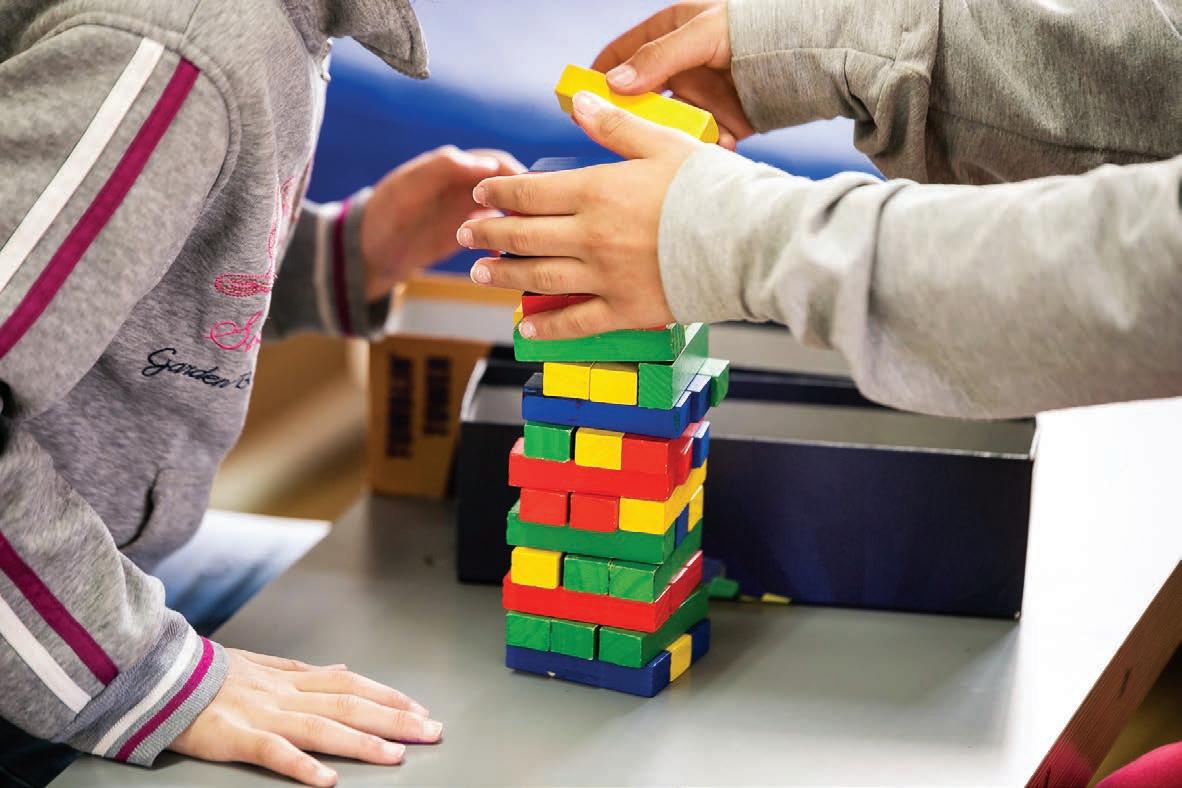
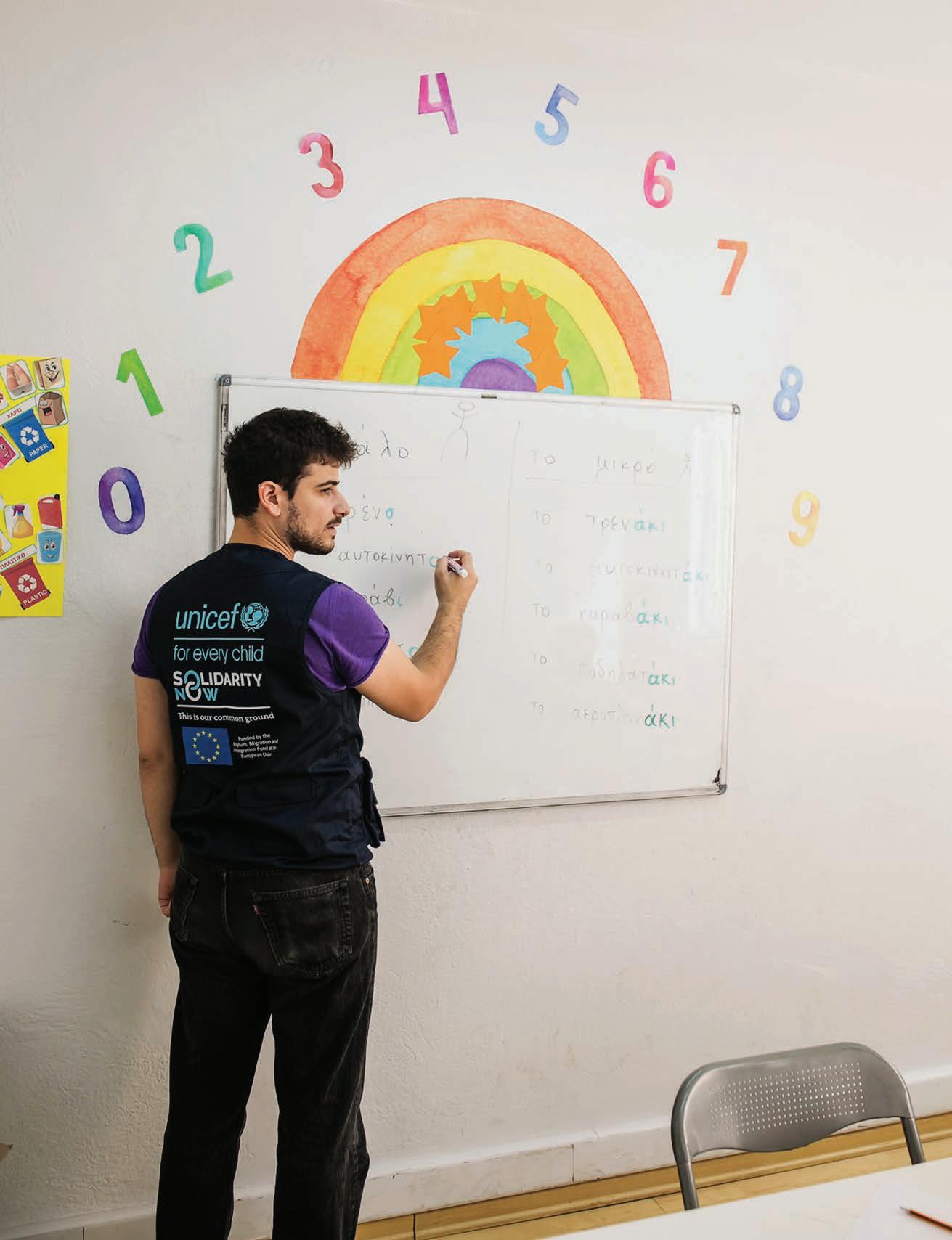
Beneficiaries supported: 84
Annual expenses: 227,640€
Donors/Supporters: National Program of the Asylum, Migration and Integration Fund (AMIF)
March 2022 marked the completion of SN’s Supported Independent Living (SIL) program for unaccompanied minors. The project was implemented with funding from the national Asylum, Migration and Integration Fund, with the support of the Special Secretariat for the Protection of Unaccompanied Minors of the Ministry of Migration and Asylum, and in collaboration with the Public Prosecutors for Minors and the Local Competent Public Prosecutors. The project had begun in 2020, hosting 84 unaccompanied boys and girls in its course, and was concluded in March 2022.
The project was part of the innovative SIL scheme addressed to children 16+, with the aim of encouraging their gradual self-reliance and strengthening their resilience to better prepare them for adulthood. The SIL model is far more than an accommodation program; rather,
building on the supported independent living structure, children are provided with psychosocial, legal, and educational support, and assisted in cultivating their everyday life skills. In the project’s 12 apartments, 8 in Athens and 4 in Thessaloniki, groups of 4 children lived in the same space; the majority were boys, while one apartment in Thessaloniki was reserved for girls. With support from the project’s staff, the children were able to discover new skills and improve existing ones. All were registered in the Greek educational system, with some of them managing to speak both Greek and English fluently and completing secondary education. They were also given the chance to become more autonomous, increasingly take on everyday responsibilities, and familiarise themselves with the cities they lived in, making friends and connections on the way. Those who became adults were encouraged to actively enter the job market and, in many cases, they
were able to find work in agriculture and the tourist industry. As a highlight, two of them were given the opportunity to become interpreters for SolidarityNow. In some cases, children achieved their family reunification with close relatives in other countries and moved on to join their family.
After the program’s closure, all children were smoothly relocated to other SILs; those who in the meantime had become adults were referred to the ESTIA urban accommodation program. This was a demanding process that required close collaboration and the concerted efforts of the entire team to ensure all children were appropriately accommodated. SN’s experience
with the SIL project highlighted its many benefits in helping children become more autonomous; at the same time, it made evident the challenges that unaccompanied children face, especially related to their limited amount of time in child protection programs before reaching adulthood (for example, many children are referred to SILs only a few months before their 18th birthday) and the lack of tailored support for former unaccompanied children reaching adulthood. This issue was directly addressed through another project SN participated in, “UACFutures”, analysing challenges and best practices for transition to adulthood.
Through the Step-by-Step project, we were able to provide:
48 accommodation places for UAMs. 12 apartments in the accommodation scheme.
Annual expenses: 2,448€
Donors/Supporters: US Embassy in Greece
Partner: Eugenides Foundation
A new project started in December, with funding from the US Embassy in Athens in partnership with the UTechLab of the Eugenides Foundation, called “Healing Trauma through Play” (Healing Play), which aims to support children and adolescents as well as parents, primarily those arriving from Ukraine, with psychological aid and educational activities to promote empowerment, psychological resilience opportunities and processing of their challenges. A child psychologist offers
individualised psychological support to children and their parents dealing with trauma, aiming to equip the parents with the knowledge and tools to effectively support their children, while youth will have the opportunity to join in STEM and educational activities. The project will continue into 2023, as an integral part of ASC and ACE and operating out of its colourful child-friendly space and the UTechLab of the Eugenides Foundation.
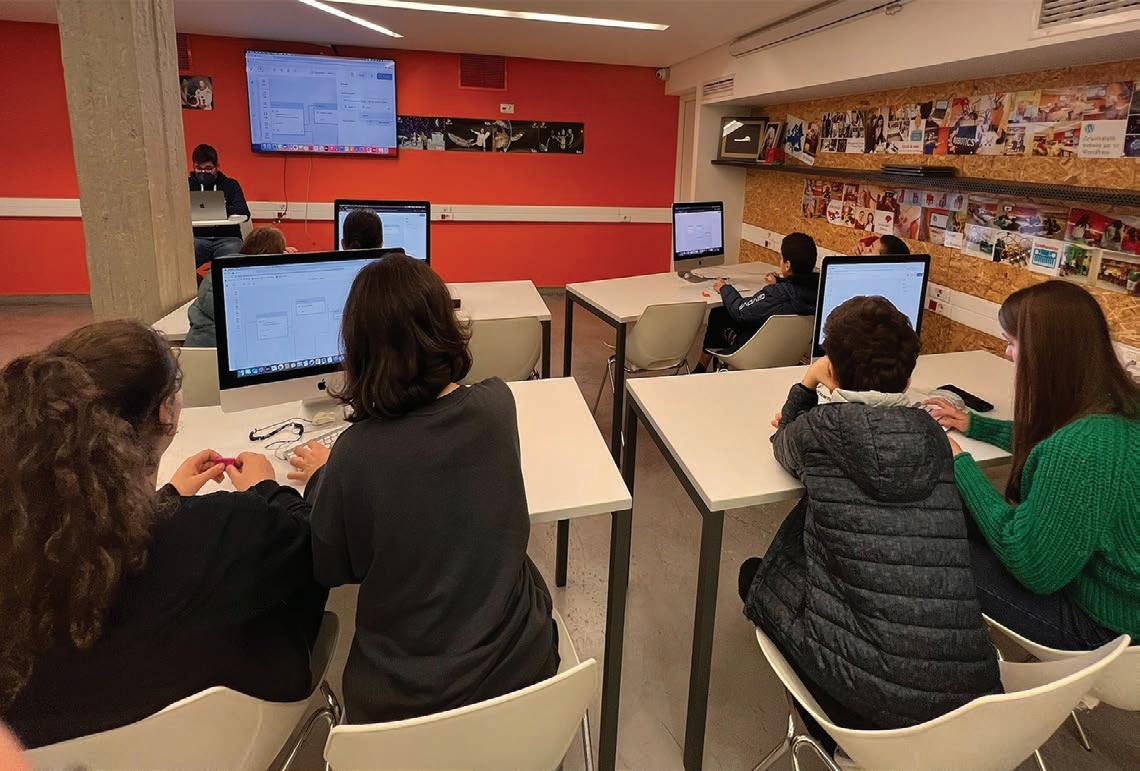
Beneficiaries supported: 145
Sessions conducted: 538
Annual expenses: 72,967€
Donors/Supporters: Major Development Agency of Thessaloniki
The BRC hosted two MDAT projects, TechIT and BEYOND, which provided education and employability counselling for children and adults. The TechIT project aims to develop IT skills for young people with a refugee or migrant background aged between 16 to 25, to assist their integration and entrance to the labour market. Seminars were provided on website design and digital content creation, basic Microsoft suite knowledge, and communication skills (including graphic design using software such as Photoshop and social media for communications and marketing). Two robotics seminars for children were also held, producing a robotic car and an electronic piano. Finally, the TechIT project addressed a very important need of BRC’s students: homework support for the IT classes of the Greek technical high school. Due to their specialized nature, the presence of an IT educator
was important to cover topics such as coding, network setup, data modeling, data transportation and TCP Packages, and data classification methods and the bubble visualization.
The BEYOND project is scheduled to continue the IT classes provision in 2023. The components that started in 2022 included volunteer mobilisation, as well as adult education, and employability counselling. The latter includes educational orientation for children, coaching them to choose a desired educational path, in close collaboration with the “All Children in Education” project that provides non-formal education. The adult education component provides Greek and English classes, covering a very important gap in adult education for all those not eligible for the HELIOS project.
Beneficiaries supported: 201
Sessions conducted: 685
Annual expenses: 26,455€
Donors/Supporters: FOCUS Humanitarian Assistance
The BRC hosted the Legal Aid project, which provided targeted legal aid to Ismaili community members in Greece. Their cases mostly concerned asylum law procedures, while there were also some civil law requests. Most beneficiaries were multimembered families, but there were also single men and unaccompanied minors who recently arrived in Greece in search of international protection. They are accommodated in various refugee camps, as well as in the urban area of
Athens; through the project’s referral mechanism, immediate contact was established with them to ensure they have access to the project’s services. Support was provided throughout the asylum process including the registration of asylum claims, the admissibility process, asylum interviews, as well as appeals against rejections. Notably, the lawyer supported several beneficiaries whose asylum applications were deemed inadmissible (and were at risk of deportation to Turkey), and assisted them to apply anew, with the necessary preparation this
time; 100% of the cases had a positive outcome.
During the summer months, an increase in newly arrived unaccompanied minors (UAM) was noted.
The lawyer was in constant communication with the children, many of whom were “detained” in smugglers’ houses. With our assistance, they were “released” and accommodated in UAM shelters.
Given the geographic spread of the population in Greece, support was provided both in-person and virtually, ensuring maximum access.
Beneficiaries supported: 316
Sessions conducted: 705
Annual expenses: 29,324€
Donors/Supporters: IsraAid Germany
During 2022, SN implemented a programme in partnership with IsraAid Germany, focusing on the following two pillars: (a) legal aid for unaccompanied minors (UAM) and youth recently turned 18, and (b) employability counselling and psychosocial empowerment for vulnerable refugees and migrants. Both components were based in the BRC. The first pillar provided legal counselling on various issues, such as first and second instance rejections, subsequent applications, family reunifications and civil law claims. The majority of beneficiaries aged 18+ were former unaccompanied minors with outstanding legal issues; their inclusion in the legal aid component was of utmost importance, ensuring former UAMs do not lose their legal support during
their transition to adulthood. The project’s lawyer also catered to the general population of BRC’s beneficiaries, following the “no one leaves Blue Refugee Center uninformed” principle; in other words, the lawyer ensured that all BRC visitors were provided with counselling on asylum issues and, in general, their rights in Greece. The project also provided employability counselling and relevant psychosocial support, in order to empower beneficiaries to recognise their strengths and set goals. In addition to jobs matching, efforts were made to support beneficiaries with career orientation, including providing information on various education pathways, especially for youth.
Project partners: Convive – Fundación Cepaim, NIDOS, the national guardianship institution, Special Secretariat for the Protection of Unaccompanied Minors in Greece, under the coordination of the Council of Europe
Annual expenses: 26,522€
Donors/Supporters: EU, Asylum, Migration and Integration Fund (AMIF)
The 18-month project implementation period started in January 2022, and is scheduled to conclude in June 2023. The project is advocacybased, with its aim being to foster long-term improvements in the quality of support for unaccompanied migrant children during their transition to adulthood at the European level. This will, inter alia, be achieved through the exchange of promising practices and the identification of practical solutions in the field. The project addresses four key areas of particular importance for unaccompanied migrant children during the transition to adulthood: (a) psychological impact and support; (b) legal support and access to basic rights; (c) access to education and the labour market; (d) access to accommodation.
During 2022, SN’s project team completed study visits in Utrecht, and Barcelona, and hosted a study visit in Athens. Currently, a toolkit for practitioners working with unaccompanied minors is under way, focusing on the provision of legal support and preparation for labour market integration. This toolkit will be made available through the Council of Europe’s e-learning HELP (Human rights Education for Legal Professionals) platform, containing information on all the key
areas. SolidarityNow also led the production of a short advocacy documentary, titled “I woke up 18”, depicting the challenges of faced by unaccompanied minors towards their transition to adulthood. In this 13-minute video, 6 young people living in Greece narrate their personal stories, highlighting how their legal status, access to education, accommodation and employment affect their lives as young adults, and impact their capacity for resilience. The video has participated in 15 filming contests and has gained 3 awards, spreading the word to the public.
Entering 2023, the next steps of the project are the organisation of a transnational workshop in Athens, bringing together representatives from trans-European and Member State institutions, academia and civil society actors to exchange knowledge and practices on the topic. Additionally, once the toolkit for practitioners is complete, in-person toolkit trainings to professionals will be offered. Overall, this project is a great opportunity for collaboration between key actors, raising the issue of unaccompanied minors’ transition to adulthood higher on the national and European agenda, with the hope to catalyse more systemic solutions in the near future.
Integration
Beneficiaries supported: 966
Total training hours: 10,683
Annual expenses: 1,777,560€
Donors/Supporters: International Organisation for Migration (IOM) in partnership with the Ministry of Migration and Asylum
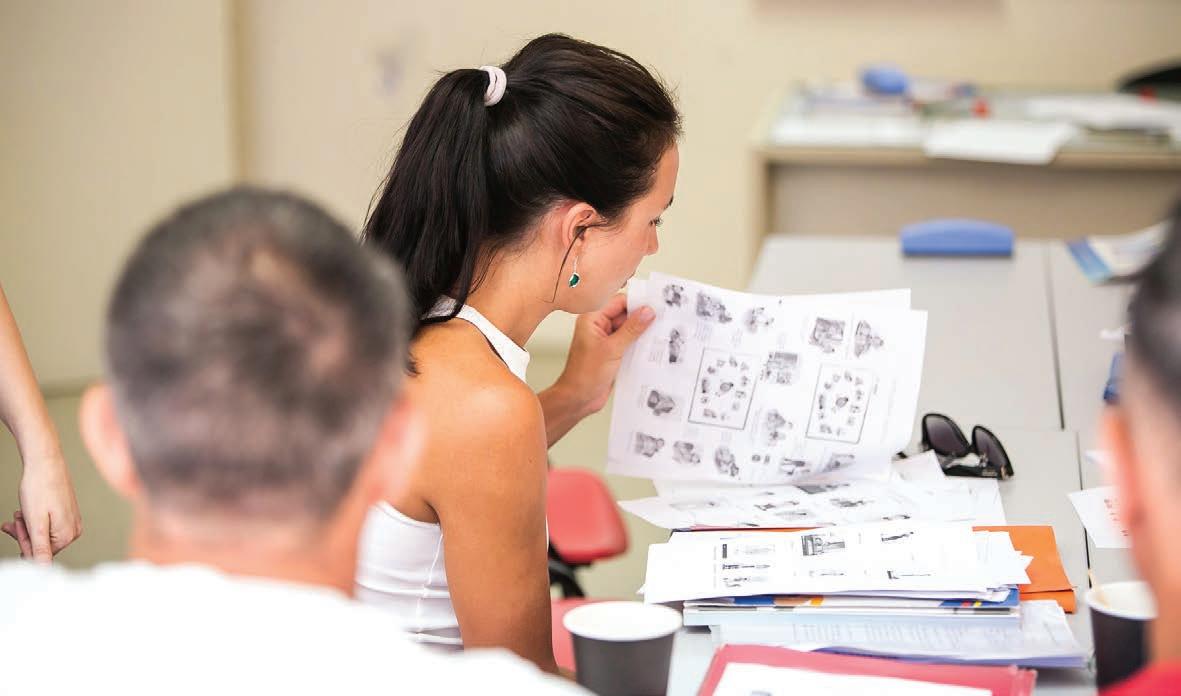
Since 2019, SN has been the implementing partner of the International Organisation for Migration (IOM) in the HELIOS (Hellenic Integration Support for Beneficiaries of International and Temporary Protection) project, operating with funding from the Ministry of Migration and Asylum. During the fourth consecutive year of the project, SN continued
to provide Greek language classes and related services to beneficiaries of international protection in our established Integration Learning Centers (ILC). SN operates three ILCs in Athens, Thessaloniki and Ioannina, while it also maintains two implementing partners who operate ILCs in Katerini (Perichoresis) and Kilkis (OMNES). The ILCs also host other HELIOS project staff that
provide, among other services, assistance with the project’s housing and employability components.
In the ILCs, SN teams provide Greek language and soft skills courses to adult refugees, with the aim of empowering them through the provision of the knowledge and skills needed to live in Greece and integrate more easily into the local community. Registered students are assigned to classes based on their language level, while teaching methodologies and materials are especially adapted to teaching Greek as a foreign language, incorporating best practices tailored to the refugee target group. Part of the soft skills taught through the project are outdoor activities aimed to familiarise students with the local community and encourage them to practice their Greek in real contexts. Students are also given the opportunity to prepare for and take the exams for the Greek language certification; this certification not only attests to their language level attainment but is also instrumental in the job finding process.
The beneficiaries may also follow classes through the project’s eLearning platform, a modality developed initially to adapt service provision to the Covid-19 pandemic measures. Today, it has been established as a way to lift access barriers that would otherwise exclude beneficiaries from attending Greek courses (i.e., beneficiaries who reside in a distant location or who find it difficult to combine work and other obligations with their education). Another best practice of the project pioneered by SN is the provision of recreational
and educational activities for toddlers and mothers through a “Mother & Toddler Space” in Thessaloniki, which is the only such space in the HELIOS project so far. Inside the space, mothers may attend classes, while a facilitator leads playbased activities with their toddlers in a specially designated part of the same classroom; this enables mothers, and especially single mothers, with young children to continue their Greek language education without having to secure childcare for those hours. Finally, each ILC also has a “Recreational Space for Children”, targeting children between 2-7 years old, which follows the same rationale, but is a separate space. There, students’ children can engage in activities while their parents attend classes.
The makeup of the HELIOS beneficiaries radically changed during 2022, due to the influx of Ukrainians fleeing the war, and arriving to Greece. This population group was subsequently granted temporary protection in the country; beneficiaries of temporary protection (BTP) became eligible to enroll in the HELIOS program in July 2022, and have shown great motivation in registering for Greek language courses across the country, including in SN’s ILCs. The Ukrainian students’ high educational profile, which includes university-level education for more than half, marked a divergence from HELIOS students’ usual background; hence, levels and methodologies had to be adapted to the new students’ needs. Ukrainians (mostly women) made up 47% of registered students, followed by Afghans (14%) and Iraqis (11%).
In 2022, the HELIOS project achieved the following milestones:
804 beneficiaries enrolled in integration courses
38 in-person and 5 e-learning classes were created
41 students obtained the Greek Language certification
207 children participated in the Recreational Spaces for Children
Beneficiaries supported: 4,109
Sessions conducted: 3,818
Annual expenses: 996,139€
Donors/Supporters: International Organisation for Migration (IOM) /EU
During 2022, SN was one of the International Organisation for Migration’s (IOM) implementing partners in the Harmonising Protection Practices in Greece (HARP) project. HARP services were provided in 25 open accommodation structures across the country. The project’s overall aim was to improve the quality of humanitarian response and protection assistance to asylum seekers hosted within the Greek Reception system. The project was funded by EU-DG Migration and Home Affairs (DG HOME). SN provided the following three components off the HARP project:
• Provision of labour market orientation to the residents of 12 sites
• Provision of legal aid and representation to the residents of 8 sites
• Operation of Female Friendly Spaces in 14 sites
The legal aid and Female Friendly Spaces (FFS) components were concluded in December 2022, while the employability component continued into the first quarter of 2023. Overall, the project provided multileveled support for refugees and asylum seekers residing in sites across Greece, allowing SN to strengthen the national reception system in terms of preventive protection and empowerment services through the FFS, access to rights through legal aid, and early integration through the employability component.
SN’s employability officers provided labour market orientation services, aiming to inform and prepare asylum seekers to join the labour market and take the first steps towards self-reliance, thus enabling an early start of the integration process. With two roving teams of employability officers and interpreters, based in Athens and Thessaloniki, SN covered 12 sites across the mainland, starting with Diavata, Malakasa, Nea Kavala, Oinofyta, Ritsona, and Vagiochori, and later expanding to include Alexandria, Drama, Kavala, Lagkadikia, Serres, and Veroia.
The teams carried out group information sessions covering labour rights, job orientation and job preparedness, job searching, CV preparation, and tips for job interviews. Group sessions were complemented by individualised counselling to explore beneficiaries’ interests, skills, and experience, provide targeted guidance, and set employment goals together. The teams also carried out extensive networking with employers, managing to significantly expand SN’s already existing network of collaborating businesses, incorporating more localised agricultural
producers and companies, as well as businesses from the construction and processing sectors. Whenever a beneficiary managed to secure a job offer, SN provided mediation with the employer to ensure the smooth completion of the process, and regularly followed up with the beneficiary once employed. Finally, events such as job fairs and targeted vocational trainings were organised at a local level, boosting beneficiaries’ opportunities to find employment.
The following milestones were achieved through the labour market orientation component:
1,299 beneficiaries received labour market orientation support. 439 beneficiaries were supported to apply for a job. 288 beneficiaries secured employment.
The legal aid and representation component was implemented by a team of lawyers and interpreters, based in five different cities across Greece (Athens, Thessaloniki, Chalkida, Kavala, Thiva), optimally covering the 8 sites included in the project component: Drama, Kavala, Koutsochero, Ritsona, Serres, Thermopyles, Thiva, and Volos. The team received referrals from each site for cases in need of legal aid and representation. The project’s target group included all site residents, but retained a focus on vulnerable groups, and especially children at risk (including separated and unaccompanied children), survivors of sexual and gender-based violence (SGBV), and members of single-headed households. Cases supported included asylum (including subsequent requests for asylum and appeals)
and civil law cases (mostly pertaining to the issuance of travel documents, but also protection cases including the issuance of interim protective measures for SGBV survivors). Additionally, criminal cases were supported on behalf of children at risk and SGBV survivors. The legal team was available 24/7 to respond to emergency incidents, both remote and in-person, thanks to the widespread presence of the team members across the mainland. It must be underlined that the project’s inclusion of representation as a core service was of utmost importance in ensuring that beneficiaries’ rights were appropriately defended. The team worked closely with IOM’s protection teams, thus ensuring that the case management process was complete with the legal aspect.
The following milestones were achieved through the legal aid and representation component:
467 beneficiaries received legal aid.
207 cases supported.
171 cases represented in court.
SN has been operating Female Friendly Spaces (FFS) since 2016, in asylum seeker accommodation sites, in partnership with UNICEF. Continuing with this successful practice, in the first trimester of 2022 the FFS component’s funding switched from UNICEF to IOM, and was integrated in the HARP project, maintaining FFS in 14 sites. Specifically, during 2022 SN supported FFS in Andravida, Diavata, Drama, Elaionas, Kavala, Korinthos, Malakasa, Nea Kavala, Oinofyta, Ritsona, Serres, Thermopyles, Thiva, Vagiochori. Each FFS was operated by a trained Female Friendly Space facilitator, supported by interpreters. An asset to the implementation of the FFS component was the addition of a roving midwife and a roving mother and toddler activities facilitator who offered their expertise and supported the FFS facilitators in sexual and reproductive health awareness and parenting skills sessions. During 2022, a Female Friendly Space guide was published, encapsulating the
experience and best practices cultivated by SN teams throughout our years of operating FFS.
The FFS offers a safe haven for women and girls, especially given the fact that most common spaces in sites tend to be male dominated. The FFS allows women to spend quality time each other, forging communal bonds. The overall purpose of the FFS is to protect and empower women and girls, with the provision of psychosocial support, skills-building, recreational activities, gender-based violence awareness-raising sessions, and info sessions on a variety of topics such as female health, women’s rights, and child protection. Through these activities carried out, FFS aim to build women’s confidence, and to inform them on their rights; in this way, it is a key prevention mechanism for violence against women. Attesting to this fact, many incidents of violence are first disclosed (and subsequently referred to the appropriate actor) inside the FFS.
640 women and girls accessed the FFS. 232 sessions realized.
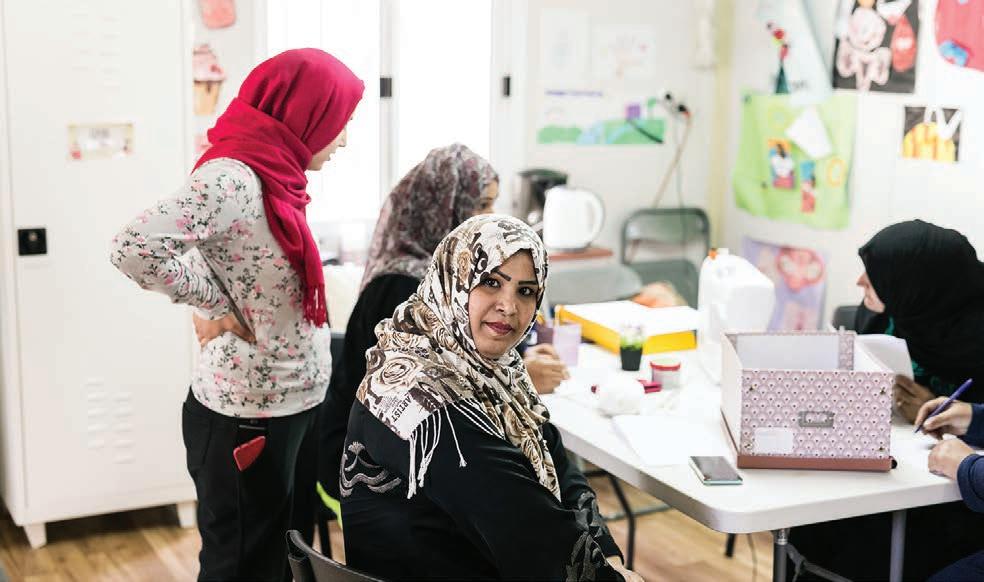
Beneficiaries supported: 50 women
Annual expenses: 18,165€
Donors/Supporters: Major Development Agency of Thessaloniki, OSF
Over the last years, SN has been increasingly involved in supporting Greece’s Roma community. In 2022, several activities were organised to support Roma communities in Northern Greece, to strengthen civil society, and provide tailored assistance women and children. In 2023, our strategic priority is to continue and expand our work with the Roma, both through field-based services and advocacy.
Our activities for supporting the Roma in 2022 are outlined below:
SolidarityNow participated in the Roma Political School organised by the Roma Women’s Association of Dendropotamos, with the support of the Council of Europe. The Roma Political School is held every year in European countries to train young Roma people to become active citizens. The meetings were held in both Athens and Thessaloniki, and included visits to local
settlements, while the discussions focused on the new national strategy for Roma inclusion 20212030. In 2023 and 2024, in view of the national, municipal, and European Parliament elections, the next steps will focus on the nomination of Roma representatives in politics, as well as the entire electoral process.
In 2022, SN continued its Roma women empowerment activities initiated during the previous year under the Mama project, funded by the Major Development Agency of Thessaloniki. Activities with local women were implemented in the settlement of Pelekas in Katerini, organised in collaboration with the Roma Branch of the Community Center. Monthly discussions were held on child nutrition, women’s health, parenthood, breastfeeding, and pregnancy. The group consists of Roma women and their children, who attend educational and recreational activities while the groups are underway.
Two housing containers were donated by SolidarityNow to the Municipality of Katerini to be used as meeting and creative activity space in the settlement of Pelekas, responding to one of the biggest problems of the settlement and the local Community Center: the absence of a meeting space for people to get together. The containers have now become vibrant and living spaces in Pelekas, hosting a variety of communal activities. Such activities and initiatives paved the way for our collaboration with more municipalities: the Roma Branch of Pavlos Melas Municipality in Thessaloniki, asked SolidarityNow to extend activities on nutrition, women’s health and parenthood for groups of women in the settlements of Efkarpia and Meteora. Our intervention in Pavlos Melas follows the model of our work in Pelekas, working with women and children to provide accurate information and incorporate the community’s own interests and concerns.
“Faros tou Kosmou” (Lighthouse of the World) is a grassroots organization that operates in the Dendropotamos settlement of Thessaloniki and provides education and child protection programmes. Faros has started the procedures to obtain a state license to host children outside of parental care. Given the complex and cumbersome bureaucratic burden of this administrative process, it became a matter
of urgency to obtain the necessary guidance and support. Over the past years, SN has built an organic partnership with Faros; hence, we were able to utilize our experience in matters of personnel, internal regulations, volunteer management, and alignment with national frameworks to assist Faros in their transition.
SolidarityNow participated in monitoring staff training (with positions as social workers, administrative support, programmes staff, security staff), and provided additional guidance, in tandem with Faros’ Board of Directors.
SolidarityNow participates in the National Partnership of the Roma Civil Monitor (20212025), coordinated by the Roma Women’s Association of Dendropotamos and including the Ladies’ Union of Drama, the Greek Association of Women Entrepreneurs (S.E.G.E.), ARSIS, Roma without Borders, Art bridges, and “Faros tou kosmou”. The Partnership aims to monitor the operationalisation of the National Roma Strategy, participate in its formulation, and ensure the coherence of the measures with the priorities set by the Roma communities as well as their alignment with relevant EU-level strategies. SolidarityNow conducted interviews with the Roma Associations and Unions for their own evaluation and presentation of ideas based on the national strategy.
Beneficiaries supported: 365
Annual expenses: 3,351€
Donors/Supporters STAR UK
The STARTnow project (Student Action for Refugees in Thessaloniki) reached its conclusion this year, after a very successful cycle that started back in 2018. The project focused on encouraging student volunteerism, adapting the model followed by the project’s donor, STAR UK, in British universities. The aim was to educate and transform students to become ambassadors for refugees and refugee protection and integration, promoting firsthand civic youth engagement. This was achieved through mobilising Greek students, training them on migration issues, and then engaging them in practical actions. Those included Greek conversation clubs bringing together students and
volunteers, cultural activities in the city, and other student-led initiatives.
Core allies to our efforts were the Thessalonikibased universities (Aristotle University, University of Macedonia, International Hellenic University). The diversity of student volunteers increased in 2021 due to the pandemic; the fact that most activities had to be carried out remotely opened the way include universities from Athens, the Peloponnese, and the Greek islands. Even though the STARTnow programme ended, the lessons learned on volunteer mobilisation have deeply enriched our overall volunteer engagement policy.
The following milestones were achieved throughout the operation of the STARTnow project:
179 student volunteers
23 student leaders
186 refugee participants
81 conversation clubs held.
Beneficiaries supported: 229
Annual expenses: 30,545€
Donors/Supporters: Erasmus+
In line with SolidarityNow’s priority to support children as they pursue an educational pathway, SolidarityNow joined the ENACTED Erasmus+ programme, led by Oxfam Italy, with the following partners: CESIE (Italy), Cardet (Cyprus), Stimmuli (Greece), and Magenta Consultoria (Spain). Throughout the three years of implementation, starting in January 2020, the project’s aim is to advocate for educational inclusion with private and public stakeholders, providing them with tools, educational materials, and relevant training. In 2022, SN managed to collect 37 good educational practices and share them through the project’s online learning platform (enacted.eu), utilising SN’s own experience and mobilising an extensive network of education actors. SN also
organised trainings and awareness-raising events for 63 educators and stakeholders (total 105) and engaged 124 teachers from formal (39) and nonformal education programmes (85) in the learning platform. The SN mentors’ team also answered users’ questions posted on the platform’s forum around the use of tools and methodologies for children’s integration in the classroom. SolidarityNow education staff also benefitted from the provision of educational tools and good practices. At the same time, the ENACTED project gave SN the opportunity to capitalize on the expertise built in inclusive education over the years and enabled strengthen our network with teachers, school administrators, and public stakeholders on a national and European level.
Beneficiaries supported: (beneficiaries engaged in 2023)
Annual expenses: 2,509€
Donors/Supporters: Active Citizens Fund /EEA Grants
It’s becoming tradition for SolidarityNow to be a part of the Pride movement, and especially the Pride parades organised in the major cities of Athens and Thessaloniki. This year, we were a dynamic part of the parades, carrying SN insignia
and declaring our solidarity with the LGBTQI+ community’s continuous struggle for equal rights. In Thessaloniki, the former mayor and member of our Board of Directors Yiannis Boutaris also walked along the SN team.
The “Empower YOUth” project started in October 2022, and will continue into 2023. SN is partnering with Norwegian NGO NorSensus Mediaforum to empower youth from different vulnerable groups, such as the Roma, refugees, asylum seekers and migrants, youth with disabilities, youth from the LGBTQI+ community, or from disadvantaged and remote areas at risk of poverty. Participating youth will be encouraged to become leaders and actively bring a positive change within their communities. The project touches upon all areas of support across the Active
Citizens Fund programme, especially regarding youth empowerment and inclusion. The project’s holistic approach aims to build confidence and provide the youth with stimuli and incentives to become active citizens, while it also aims to foster dialogue and collaboration across vulnerable groups. Through the project, participants will be supported to lead initiatives that positively influence their communities. This will be achieved through a series of training courses, activities with role-models, and community small-scale activities.
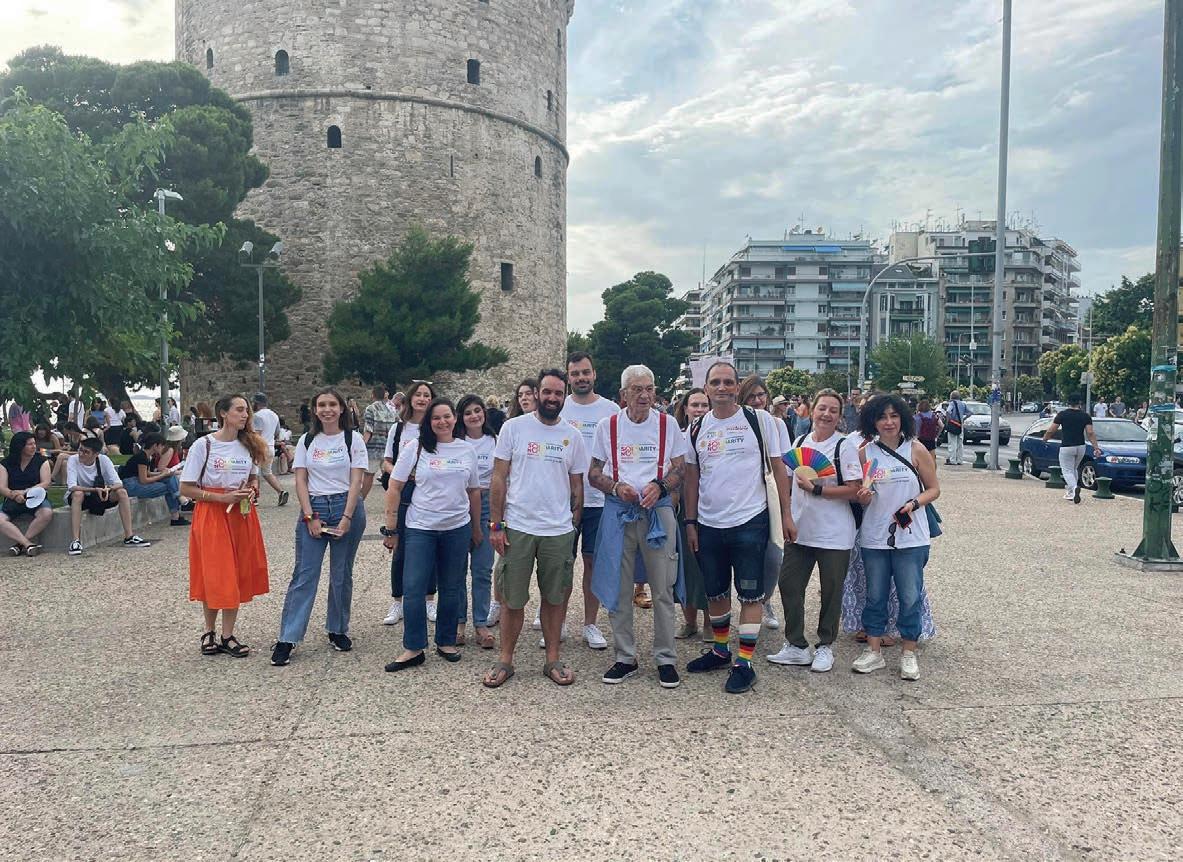
2022 was marked by war breaking out within the borders of Europe; something that had not happened since the armed conflicts of former Yugoslavia in the 1990s. In February 2022, Russia mounted a full-scale invasion of Ukraine. The invasion caused the largest refugee crisis in Europe since World War II. The European nations quickly mobilised to stand by those displaced by the war, offering temporary protection status to all Ukrainians fleeing their country. In Greece, more than 80,000 Ukrainians have arrived; 22,000 have received temporary protection status. Behind the numbers are human lives lost, families separated, and uncertainty regarding returning home.
SolidarityNow was from the very first moment on the side of all those who arrived in Greece from the war zone, responding directly to the needs of the new refugee population, composed mainly of women and children. Our first action was to provide documented answers to the most frequently asked questions by the refugees through the “Guide for Ukrainian refugees” created in our website. Subsequently, we mobilised funds and personnel to create a host of actions to respond to the crisis and help those displaced.
In partnership with UNICEF Greece, we designed and are currently implementing a project specifically for Ukrainians. The Ukrainian emergency response project focuses on Northern
Greece, specifically on three strategic locations for the Ukrainian inflows, and provides protection services safeguarding the psychosocial wellbeing of women and children: (a) in Promachonas, the Greek-Bulgarian border crossing point which accepts most Ukrainians arriving to Greece by car, SN operates a Child Friendly Space (CFS); (b) in the Serres accommodation site, which hosts a great number of Ukrainian refugees, we provide early childhood development activities for children under 4, as well as psychosocial support (PSS) activities for them and their families; (c) in the city of Thessaloniki, where many Ukrainians have settled, we provide PSS activities for children and mental health and psychosocial support for women through the Blue Refugee Center.
• 239 beneficiaries accessed the CFS in Promachonas
• 127 beneficiaries accessed PSS services in Serres and the Blue Refugee Center
Additionally, we have welcomed the newly arrived Ukrainian community in our other relevant programming, ensuring adaptation to their specific needs, wherever needed:
• 458 Ukrainians attend Greek language courses through the HELIOS Project
• 388 children from Ukraine attend courses through their participation in the program
“All Children in Education” in Northern and
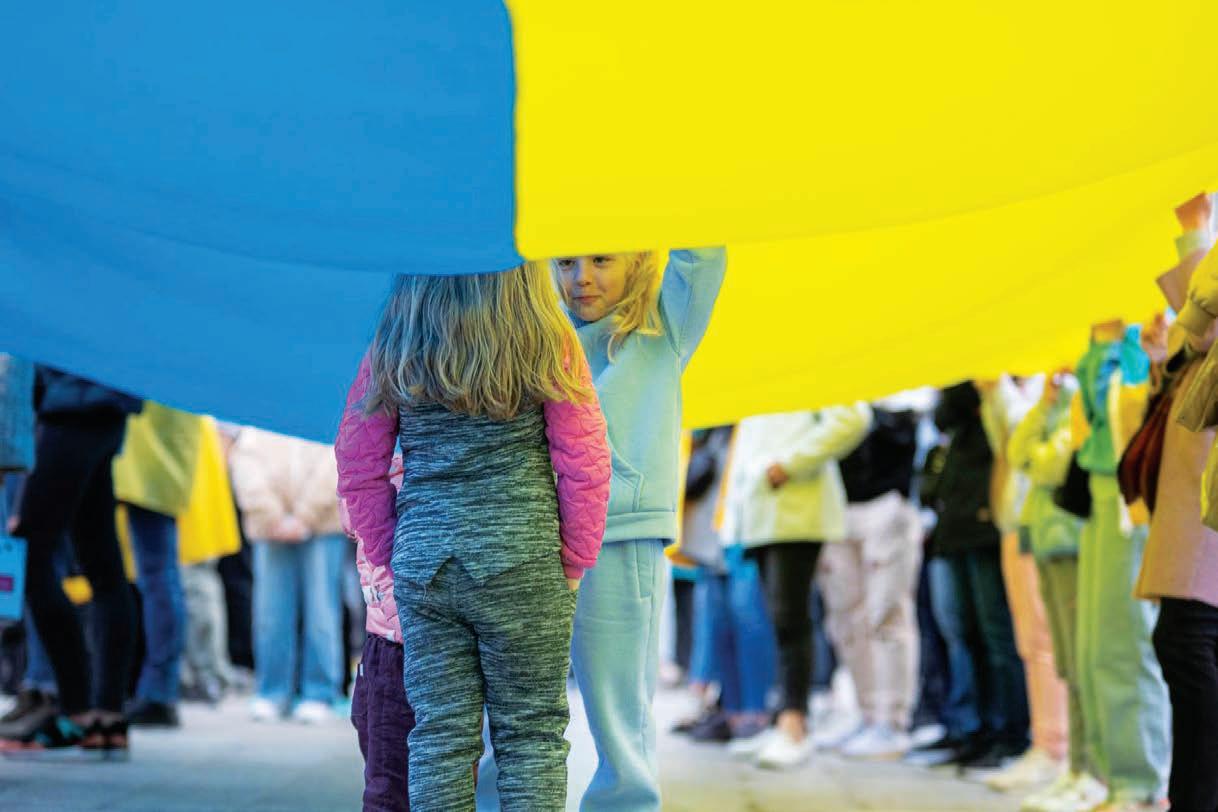
Southern Greece, supporting their smooth transition to the Greek public education system
• 158 Ukrainians have accessed the social service of the Athens Solidarity Center with the main request to cover basic needs for: medical care (15%), asylum application in Greece (12%), housing and social welfare benefits (12%) and/or the issuance of legal documents (6%)
• 146 have received support by the employability services provided by the Athens Solidarity Center and by the organization’s
experts at the open accommodation sites in Serres and Kavala; 81% of them are women
• 31 children from Ukraine have attended robotics workshops at the Eugenides Foundation, as part of the Healing Play program implemented with the support of the US Embassy in Athens.
Today, we continue standing beside Ukrainians in Greece, supporting their integration in their local communities, and promoting their wellbeing.
Total budget: 13,5m€
Organisations supported: 168
Beneficiaries supported: 53,607
Donors/Supporters: EEA Grants
SolidarityNow acts as the Fund Operator for the EEA Grants Active Citizens Fund in Greece, in cooperation with the Bodossaki Foundation. The Active Citizens Fund in Greece is supported through a €13,5m grant from Iceland, Liechtenstein, and Norway as part of the EEA Grants 2014 – 2021 Programmatic period. The programme aims to develop the sustainability and capacity of the civil society sector in Greece, and to strengthen its role in promoting and safeguarding democratic procedures, active citizenship, and human rights.
2022 has been a very productive year, with projects resuming their activities in full speed and capacity, and the programme being on track to achieve or surpass most targets. Several projects are either reaching completion or have been completed and reported noteworthy results. By the end of 2022, a total of 168 civil society organizations have been contracted and are implementing a variety of projects across Greece, while 78,000 individuals were engaged in and benefiting by their activities. It is worth mentioning that almost 10,000 individuals were educated about civic rights and participation and/or media literacy, while 53 advocacy campaigns were carried out to promote transparency, accountability and good governance.
In February 2022, a new open call for proposals was announced aiming at the institutional development of civil society organizations. The new grant, budgeted at €661,387, concerns the strategic development of CSOs. For Greece, this is an innovative Call that differs significantly from the previous ones under the Active citizens fund programme, as it provides grants that will subsidise general actions of CSOs based on their multiannual strategic plans rather than actions in the context of projects with a specific thematic focus. The new Call is part of a pilot initiative of the EEA Financial Mechanism, launched in response to the requests made by CSOs for making available grants to subsidise their basic operational requirements, thus helping them attain their strategic goals and fulfil their mission.
In response to the Open Call “Organisational grants for the strategic development of civil society organisations”, a total of 52 applications were submitted, of which 5 were approved. Bilateral relations were accelerated in 2022 and the amount allocated to the open call for the promotion of bilateral relations between Greek CSOs and entities in the donor countries was increased (additional €50,000). By the end of 2022, we had a total of 25 approved bilateral applications, while increased interest is shown from future potential applicants.
Regional activities resumed in 2022, with two activities implemented by the Greek consortium. In March , an online conference on the digital dimension of violence against women was organised in partnership with the FO of ACF Cyprus, and in cooperation with the Council of Europe and the Norwegian Ministry of Justice and Public Security, as a part of the EEA and Norway Grants SYNERGY Network against Genderbased and Domestic Violence, and with the participation of FRA. In November, two Capacity Building workshops that were jointly organized in Athens by the ACF Fund Operators in Greece, Portugal and Romania. The workshops aimed to support Fund Operators of the EEA Grants Active Citizens Fund in their capacity development role. Participants from 15 countries participated in this activity.
Finally, all Project Promoters continued their participation to the Capacity Building Programme (CB), organized by the Fund Operator, through Social Dynamo, the civil society capacity building hub of Bodossaki Foundation. It is worth
mentioning that by the end of 2022, 112 out of 119 active project promoters (94%) had participated in optional capacity building activities. During 2022 the pre-defined project #2 “Research on the contribution of Civil Society to the Greek economy”, was successfully concluded by Bodossaki Foundation’s subcontractor the Foundation for Economic and Industrial Research (IOBE). The result of the study will be shared with stakeholders, media, and the public in the first quarter of 2023. The research highlighted the key contribution of the CSOs to the national economy, “supporting, directly or indirectly, the production of 1.6% of the country’s GDP and contributing with 1.9% of the employment in the country”. However, despite the vital role of the Greek civil society, a high sentiment of mistrust towards CSOs in the country is also reported.
Finally, the programme successfully received an unqualified audit opinion following the Financial and Management and Control Systems (MCS) audit by KPMG Finland commissioned by Financial Mechanism Office (FMO).
2022 was the latest in a series of years that put into perspective nearly everything that civil society had previously considered a given. At the aftermath of an unprecedented global pandemic, the war in Ukraine broke out within the borders of Europe, challenging years of human rights acquisitions.
In the Greek context, these global trends are compounded by enduring local challenges. The energy and cost of living crises caused by the war in Ukraine are the latest in a series of blows to the Greek economy, which followed the pandemic-triggered recession.
Greece has remained on the forefront of Europe’s asylum and migration challenges since the onset of the refugee crisis in 2015. The overall number of people arriving in Greece has reduced significantly over the last years. Nevertheless, conditions have not improved for many vulnerable people seeking safety in Europe, who still face significant and persistent barriers, structural and practical obstacles, from accessing the territory, to a fair asylum procedure and dignified reception and integration, with harmful effects on their safety and wellbeing.
The barriers to the labour market and the employment exploitation of thousands of vulnerable migrant workers are a disappointing reality in Greece. This reality is the outcome of the shortcomings of social, employment and migration policies, in combination with recent legislative developments, which have rendered acquiring a legal status burdensome.
Tackling the roots of the problems that vulnerable migrant workers, whether documented or not, face ranks high in SN’s advocacy agenda.
SolidarityNow participated in the Advocacy Working Group, as well as in additional working groups among the following:
• livelihoods,
• communicating with communities,
• protection,
• education,
• mental health,
• gender-based violence and
• legal aid
In the field of child protection, we actively participated in the Child Rights Advocacy Network (CRAN). We also participated in the working groups of the Coordination Center for Refugee and Migrant Issues of the Municipality of Athens (ACCMR). Our networks include the EMA trafficking working group, as well as the UNHCR inter-agency working group.
At the same time, we remain members of the Hellenic Housing Network, where we are also members of its Board. SolidarityNow also participates in the National Partnership of the Roma Civil Monitor 2021-2025 coordinated by the Roma Women’s Association and includes: the Union of Women od Drama and the Association of Businesswomen of Greece (S.E.G.E.).
SolidarityNow is a member of the Racist Violence
Recording Network, an initiative founded by the Hellenic National Commission for Human Rights (HNCHR) and the Office of the United Nations High Commissioner for Refugees in Greece (UNHCR), involving 52 non-governmental organizations and institutions of civil society, as well as, as observers, the Ombudsman and the Council for Immigrant Integration of the Municipality of Athens. Members of the network recognize and pursue as a common goal the fight against racist violence and all acts of hatred motivated by race, colour, religion, descent, national or ethnic origin, sexual orientation, gender identity, gender characteristics and disability.
SN’s participation underlines its commitment on promoting human rights and addressing the issue of racist violence and hate speech.
SN is an active member of European and international networks, including the Vulnerability Experts Network of the European Asylum Support, the Platform for International Cooperation on Unaccompanied Minors (PICUM - Platform for International Cooperation on Undocumented Migrants), the European Federation of National Organizations Working with the Homeless (FEANTSA) and the European Council for Refugees and Exiles (ECRE).
In February, SolidarityNow, appeared before the National Commission on Human Rights in order to support a complaint report submitted by lawyers, participating in the legal aid working group, concerning omissions and bad practices of the asylum service during the asylum procedure.
Additionally, representatives of the legal and
employability team of the Athens Solidarity Center participated in “Not Alone in Europe” program and delivered a “train the trainers” educational seminar for LGBTQI+ refugees in Greece in May. The project pursues the double aim of educating and training youth workers who are meeting young LGBTQI+ migrants, refugees, and asylum seekers. With this action, SN supported the
creation of a network for support and visibility for young LGBTQI+ migrants, refugees and asylum seekers.
In the same context, SolidarityNow organized a Study Visit to Athens in September, on the agenda of “Building Futures, Sharing Good Practices: Migrant Children’s Transition to Adulthood”, a program jointly implemented by the Council of Europe, the Special Secretariat for the Protection of Unaccompanied Minors, SolidarityNow and Fundacion Cepaim & Stichting Nidos, where we shared challenges and good practices with actors from other European countries, concerning the smooth transition to adulthood of UAMs.
In September, in order to complement our advocacy strategy regarding transitioning to adulthood, SolidarityNow organized a Breakfast briefing: “Migrant Children’s Transition to Adulthood” within the framework of the annual Athens Democracy Forum. The discussion was on
the topic of unaccompanied children becoming 18 years old in Greece and the challenges they face deprived of any previous supporting framework.
In October, in the context of a conference organized by the Greek Council for Refugees in implementation of the program, Foster Action and Support to Trafficked persons –FAST (AMIF 20202022), we presented our experiences regarding the provision of legal and psychosocial support to survivors of human trafficking, and specifically about the challenges we have been facing and the good practices we have adopted.
SolidarityNow participated, as member of the Advisory Group, at the EUAA VEN annual conference, which took place in Brussels, Belgium, on 15 and 16 November 2022, on the thematic: Mainstreaming Vulnerability in Reception and Asylum Procedure, regarding the treatment of vulnerable asylum applicants in Europe and shared good practices from our experience.
In March, SolidarityNow wrote a letter to the Special Secretariat for the Protection of Unaccompanied Children, which was shared with the Head of Greek Police with regards to the unlawful detainment of unaccompanied children by the Police with the form of protective custody. The procedure of detainment of unaccompanied children at police stations, even though abolished by legislation, was still applied to unaccompanied children.
In April, the organization cosigned the petition “Project children on the Move”, initiated by KidsRights, regarding their project Children on the Move, which included four recommendations to
national and European politicians to better protect unaccompanied refugee children. This petition was based on the Convention on the Rights of the Child, to which Greece is also a signatory.
In July, SolidarityNow and civil society organizations published a press release arguing in favor of the granting of a special residence permit to unaccompanied children, in accordance with both the recent declarations of several institutional actors and the policies foreseen in the National Strategy for the Protection of Unaccompanied Children. In the press release it was argued that in Greece unaccompanied children face a systemic lack of a protection
regime that ensures unhindered access to all children’s rights such as housing, education, health, equal treatment, like any other child. Considering that this problem makes unaccompanied children vulnerable to violence and exploitation, civil society organizations requested the granting of a special residence permit to them until at least the completion of the 21st year.
Following the above, a special on-line event was organized during July by the Child Rights Advocacy Network (CRAN), where SolidarityNow and more than 30 civil society organizations participated together with policy actors. Further on,
In September, in the context of the Legal Aid Working Group we cosigned a letter addressed to the Minister of Migration and Asylum regarding their latest trend of not issuing asylum applicants’ cards and residence permits by claiming technical obstacles. The problem was resolved after our intervention.
Regarding the deficiencies of the platform through
In March, together with the representatives of other 26 civil society organizations active in the areas of asylum and migration in Greece, we addressed a letter to the EU Commissioner of Migration and Home Affairs, Ms Ylva Johansson, whereby we
in November, the organization, along with other civil society organizations of the CRAN network, issued a press release, where our disappointment for the inaction regarding the legislation for a special residence permit for UAMs, was highlighted.
To further support the above advocacy campaign with regards to transitioning to adulthood, SolidarityNow produced the film “I Woke up 18” which presented through the stories of its six young protagonists, the difficulties that unaccompanied children face as soon as they turn 18 (read more in the “Humans and their Stories” section).
which asylum applicants can apply for asylum, in November, SolidarityNow together with other actors in the field cosigned a letter where we highlighted the dysfunctionality of the platform. Following our letter, we met with the General Secretary for Reception and Identification, Mr. Logothetis, with whom we thoroughly discussed the above issues.
conveyed our concerns regarding systematic noncompliance by Greece with the Asylum Procedures Directive as regards the safe third country concept.
SolidarityNow participated in the 10th Thessaloniki Pride Festival, which was dedicated to education, by holding a webinar. As part of the seminar, the results of the European program “Not Alone in Europe” were presented, as well as the new digital and printed edition of SolidarityNow entitled “Useful Guide for Professionals for LGBTQI+ Migrants, Refugees, Asylum Seekers”. It is a short guide with comprehensible, grouped information and good practices that will be a useful tool in the hands of those working in the
field, but also anyone who wishes to be informed about the basic terminologies regarding the LGBTQI+ community.
Acts of discrimination towards LGBTQI+ refugees are still ongoing. Τogether with other civil society representatives, we consigned a letter in August addressed to the General Secretary of Reception of Asylum Seekers and the Secretary General of Migration Policy highlighting particular concerns relating to the situation of LGBTQI+ asylum seekers in Greece.
Social workers at Athens Solidarity Center identified and made public, the problem of previous beneficiaries of the “Guaranteed Minimum Income” (GMI) who no longer qualify because of the increase of the objective property values. The income support provided through the welfare program “Guaranteed Minimum Income” (GMI) is the only means of financial aid for hundreds of thousands of Greek citizens as well as foreigners living in Greece in conditions of extreme poverty. The beneficiaries of the program are defined through income and other property criteria, which have been determined with a view to its distribution as fair as possible. However, in practice, it is noted that sometimes, decisions concerning the general economic policy leading indirectly to the redefinition of living standards, exclude from the specific financial support, individuals and families whose real financial
situation does not justify this exclusion. Such an example is the recent redefinition of the objective property values and their increase, especially in the center of Athens. SolidarityNow publicized this matter and informed the relevant stakeholders. Together with Emphasis Foundation we sent a letter to the relevant agencies regarding the issues concerning people who are homeless. More specifically, our intervention concerned the issuance of a Homelessness Certificate. This document is necessary, in addition to certifying a person’s status, for the issuance of other legal documents. Unfortunately, its extradition and the lack of it when extradition is impossible lead to impasses, isolation and deprivation of the right to join. In order to have a system that is functional and close to the citizen, we proposed specific positions to address the bureaucratic loopholes.
In July 2022, the law on guardianship (L. 4960/2022) was published, passing on the general competency of guardianship to the Special Secretariat for the Protection of UAMs of the Ministry of Migration and Asylum, from the National Center for Social Solidarity of the Ministry of Labour and Social Affairs. SolidarityNow submitted comments and recommendations for the new guardianship law, which was open for public consultation and on 15.07.2022 we were also invited to present our comments in an oral hearing before the Parliament.
The National Action Plan for the Protection of Children from Sexual Abuse and Exploitation is a road map that harmonizes the scattered provisions governing the framework and introduces a significant change in the mindset of the intervention, which echoes the vision of zero tolerance for sexual violence against children. Along those lines, SolidarityNow submitted, at the open consultation, its proposals, and recommendations for a more inclusive and child friendly justice.
REGARGING THE STANDARDS AND REGULATIONS OF HOUSING APARTMENTS AND APARTMENTS SEMI-INDEPENDENT LIVING OF UAMs
SolidarityNow, on 23.11.2022, warmly welcomed and commented on legislative initiative for the establishment of Standard Rules for the Operation of Semi Independent Living Apartment for UAM, which was put to vote, as provided by par. 7 of article 66 of the Law 4939/2022, added by Article 33 of Law 4960/2022 “National Guardianship System and Framework for Hosting Unaccompanied Minors and other provisions under the jurisdiction of the Ministry of Immigration and Asylum” (A’ 145), which was open for public consultation. olidarityNow, having previous experience by the operation of Semi-Independent Apartment for 16-18-year-old UAM provided constructive remarks on the public consultation.
Finally, as Members of the board of the Greek Housing Network, at the end of 2022, SolidarityNow was actively involved in the consultation on the new social housing Bill. The positions of the Network (as they emerged through close cooperation with its member organizations) were presented to the Social Affairs Committee of Parliament.
There were many communication highlights for 2022, let’s have a look to some of them!
Six children. Six unaccompanied children. One word, one world of difference. Six people talk about life in the new country, Greece, a life that changes abruptly turning incredibly difficult at 18. Dreams, disillusionment, fear and hope of six young people.
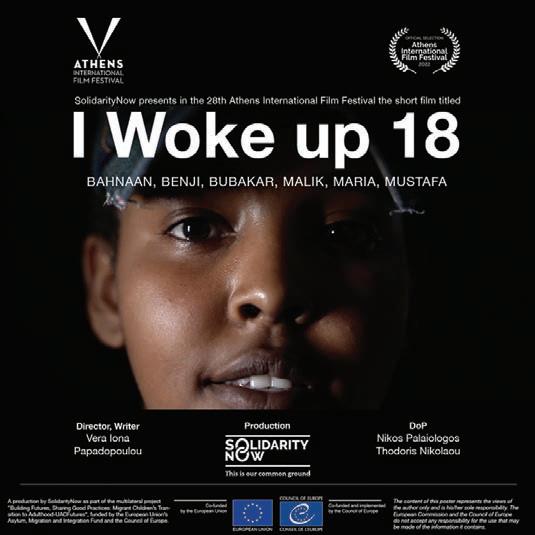
What is it like to be in a foreign country as an unaccompanied minor?
What is it like to be approaching 18 and know that you will lose all the help that was provided to you until you reach adulthood?
In the framework of the European project “Building Futures, Sharing Good Practices: Supporting Migrant Children’s Transition to Adulthood”, SolidarityNow gave the children themselves the opportunity to answer the above questions and more. The means? A short film.
The film was screened for the first time on September 30, 2022, in the framework of the 28th Athens International Film Festival, in a screening with guests including the protagonists themselves, the cast and a large number of people who responded to
the organization’s invitation and came to the cinema to watch the film and thus to be informed and raise awareness about this major issue that concerns us all.
Click on the video
Director, Writer: Vera – Iona Papadopoulou
DoP: Nikos Palaiologos, Thodoris Nikolaou
Production: SolidarityNow
After the premiere of the film in Athens, “I Woke Up 18” started its cinematic journey in festivals around the world where it received many awards!
* The short movie was produced in the context of the European project “Building Futures, Sharing Good Practices: Supporting Migrant Children’s Transition to Adulthood” implemented by 5 partners: the Special Secretariat for the Protection of Unaccompanied MinorsMinistry of Asylum and Migration and SolidarityNow from Greece, Convive – Fundaciόn Cepaim from Spain and NIDOS, guardianship for refugees from the Netherlands, under the coordination of the Council of Europe. The project is funded by the European Union’s Asylum, Migration and Integration Fund and the Council of Europe.
One day before the premiere of the film “I Woke Up 18”, SolidarityNow highlighted the issue of the coming of age of unaccompanied children living in Greece, at the workshop organized in the framework of the annual Athens Democracy Forum, on the topic: “Migrant Children’s Transition to Adulthood”. The content of the meeting was a continuation of the 2021 meeting on unaccompanied minors living in Greece. Taking the public debate one step further, the organization focused on the issue of children’s transition to adulthood and all that it entails, namely labor market integration, housing autonomy and skills development. Most importantly, the discussion highlighted the issues and challenges faced by
unaccompanied children who turn 18 in Greece, deprived of any previous supportive framework.
Speakers at the event included the Special Secretary for the Protection of Unaccompanied Minors, Mr. Heraclus Moskoff, the Head of the Unit for Integration and Support of UAMs of the Special Secretariat, Ms. Gelly Aroni, the internationally renowned economist, academic and political analyst, Jeffrey Sachs, the academic Ms. Jennifer Cavounidis, a member of the Board of SolidarityNow, Chairman of the Board of Directors of SolidarityNow, Mr. Stelios Zavvos and Marilyn Polena, General Manager of SolidarityNow.
Click on the article
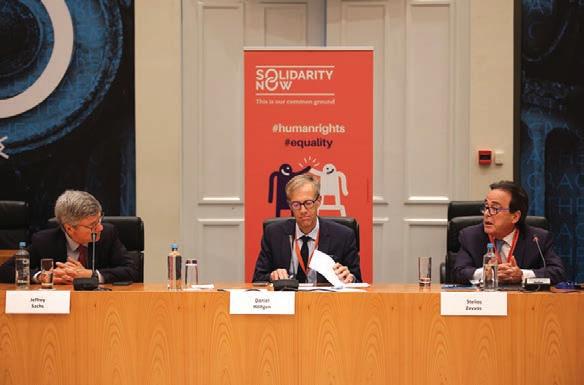
And the young woman who spoke to REUTERS is none other than the talented Roya, who lives in the open accommodation site of Thebes and is a beneficiary of the organisation’s “Homework and Creative Activities Center”, which operates under the “All Children in Education” programme.
But why Roya? Because through a SolidarityNow storytelling tribute, her talent for painting was highlighted. Through her
art, Roya expresses her feelings, ideas and thoughts about her country, about women and how it feels to be living far from one’s home.
The REUTERS tribute to Roya took place on the occasion of March 8, International Women’s Day, with a day-long visit by journalist Karolina Tagaris to Roya’s temporary “home”, the Thebes site.
Click on the article
Excerpts from the interview
“When I start to paint (it’s) like I’m traveling in another world, in another place that there is peace”.
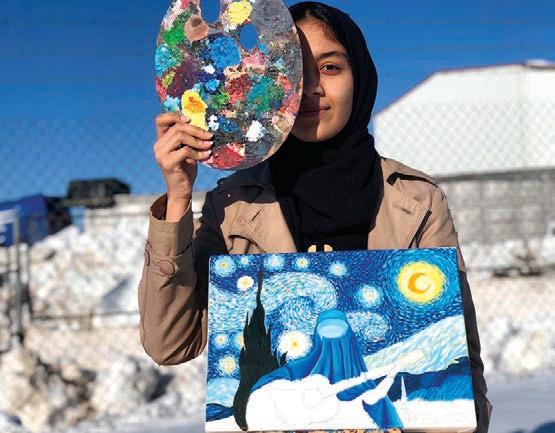
Another one of her paintings, in the style of Vincent van Gogh’s “Starry Night”, shows a woman in the traditional blue Afghan burqa playing the guitar.
“I wanted to show that they (women) can be whatever they want... They are free to do anything, to believe in their power and what they like to do. It’s good to be themselves, it’s good to speak”.
*The “All Children in Education” project is a UNICEF initiative in collaboration with the Ministry of Migration and Asylum, co-funded by the European Union, and implemented by a number of partners, including SolidarityNow.
How did the refugees from Ukraine live their first days in the Greek school?
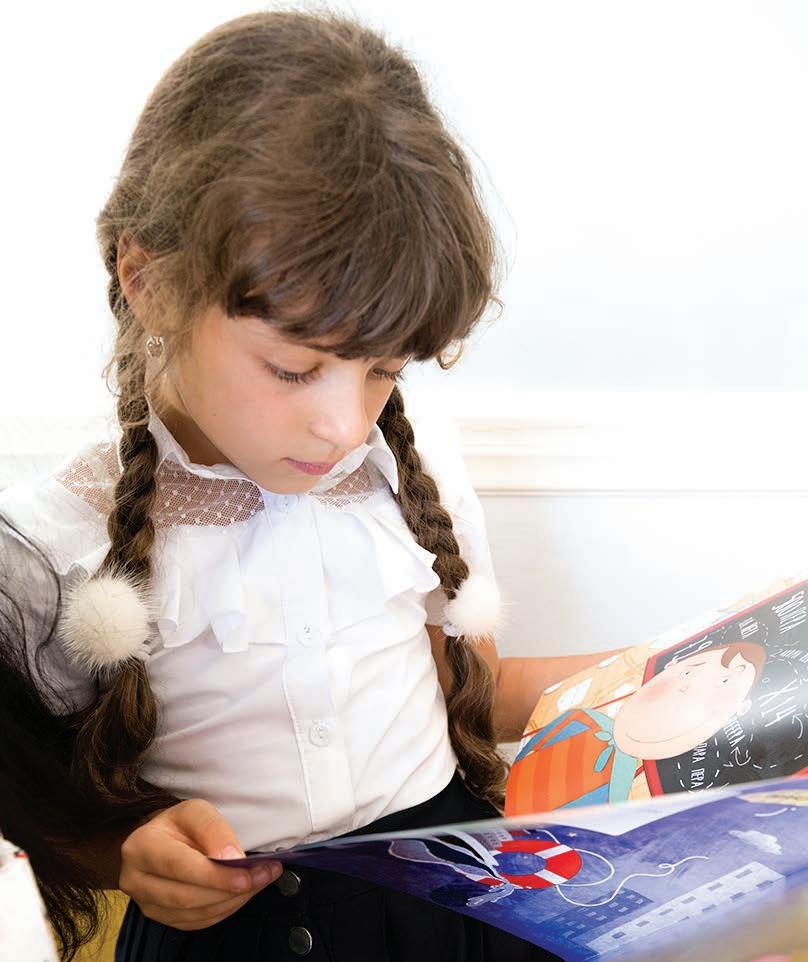
This is the title of the extensive tribute of the “K” magazine of Kathimerini newspaper to the “All Children in Education” programme implemented by SolidarityNow in six regions of Greece. The journalist Kelly Stavropoulou visited the “Homework and Creative Activities Center” operated by the organization in Athens and talked to mothers and children from Ukraine, who were the new students enrolled in the Center, as well as in public schools, for 2022.
And this program, like all of the organization’s programs, including the Solidarity Centers in Athens and Thessaloniki, responded directly to the emergency need that arose for displaced people from Ukraine due to the war that broke out in February.
Excerpts from the article
“The start of the school year arrived, and my main anxiety remained, how my child would adapt to a school where no one speaks Ukrainian, how her mood would be, how she would react. She herself is finally excited. She even says that when she grows up, she wants to be a Greek teacher. Specifically, she says that when we return to Ukraine, she will go to the headmistress of the school and ask to be given a class to teach Greek to the other children.” Mother of 7-year-old Anastasia
“Do you speak Greek? Do you want to learn?”, I replied. “So and so,” he said in fluent Greek and explained: “Sometimes I want to, sometimes I’m bored. When the mood changes, the desire changes. Anyway, I believe that in a year from now I will have learned the Greek language very well.” His mom, Victoria, spoke to me very openly about Paul, as if she needed to share her anguish: “In Ukraine the child had no friends. He has a very
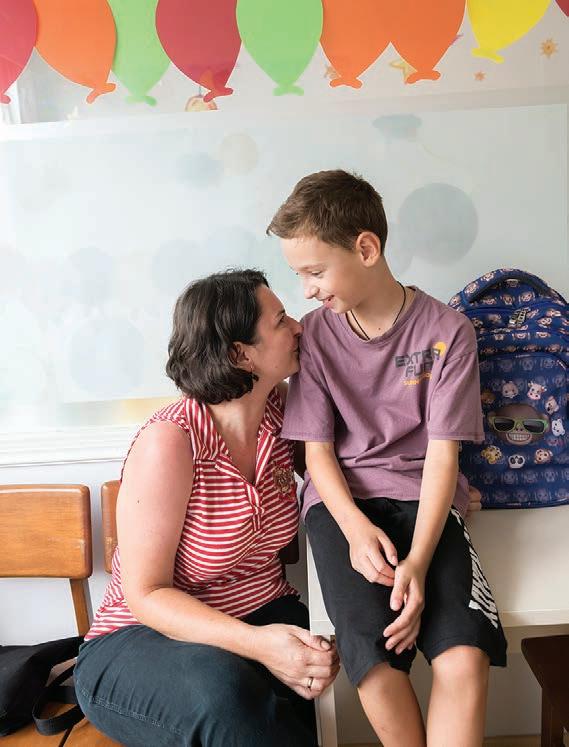
‘soft’ character, and they made fun of him, bullied him. He started at the Greek school right away - we arrived in the country on March 4 - and my anxiety was how he would adapt, how he would survive without speaking the school language. I was terrified that he would be bullied again because he is very good-hearted. I didn’t want him to get hurt. I was shocked at how well the little Greeks treated him. The way they welcomed and hugged him. And so did the teacher. I’m touched to say it. My child is happier here and time goes by and all day I wonder what I’m going to do. I’m banging my head. Because on the one hand I want to return to Ukraine at some point - that’s where my husband, our home, my job is - on the other hand, my child’s best interest is probably to stay here. I see how much happier he is, how much better he’s doing in school, how much better he’s doing in everything.” Victoria, mother of 10-yearold Paul
In the summer of 2022, the Social Service of the Athens Solidarity Center noticed an increase in the number of people visiting the Center requesting to understand why they were no longer entitled to financial assistance through the “Guaranteed Minimum Income” (GMI) welfare program.
The income support provided through the welfare program “Guaranteed Minimum Income” is the only means of financial aid for hundreds of thousands of Greek citizens as well as foreigners living in Greece in conditions of extreme poverty.
This risk had arisen from the redefinition and increase in property values. As a result of this development, beneficiaries of the GMI risked being excluded from its payment because of the increase in the objective value of their property, in which they live. Through the publication of
Ms. E.X.’s story and a related press release, SolidarityNow highlighted the issue.
Such a case is the one of Ms. E.X., a beneficiary of the Athens Solidarity Center, whose apartment’s objective value increased from 60,000 to 115,000 euros, thus far exceeding the established limit of 90,000 euros for the GMI. The woman in question has no other income, is over 55 years old and has various health problems, which make the financial support of the ‘Minimum Guaranteed Income’ literally a matter of survival.
A few days after the above publicity, an independent MP submitted a question to Parliament.
From 1/8/2021 to 31/12/2022, the Athens Solidarity Center’s operation was supported through a grant from the Stavros Niarchos Foundation (SNF) in the framework of its global COVID-19 Relief Initiative.
From 1/8/2022 to 31/12/2022, the Athens Solidarity Center was financed by EEA Grants, with ΣΟΛ Crowe and HumanRights360 as the fund operator.
From 1/7/2021 to 31/12/2022, the Kahane Foundation supported the Psychological Service of the Athens Solidarity Center.
In all the cities where the organization is present, events, film screenings, musical events, painting and photography exhibitions, speeches and much more were organized to honor the man who throughout history has left his country in search of security, peace, freedom, a better present and future elsewhere.
Among the above, an exhibition of artworks by minors and adult refugees was hosted from 13 to 20 June at the Thessaloniki Refugee Museum, which was complemented by photographic material by professional photographers and audiovisual projections.
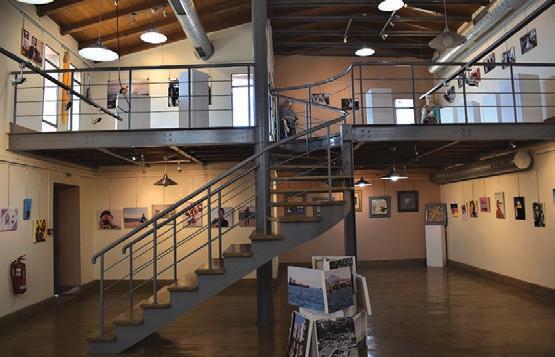
The exhibition included paintings, poems, constructions and photographs created by beneficiaries of the organisation. The exhibition was publicized through a press release and the visitors exceeded expectations in numbers!
SolidarityNow responded to the invitation of the street magazine “Shedia” and took part in the football tournament with which we all
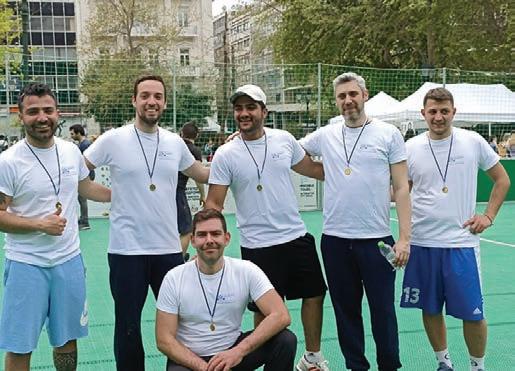
celebrated the 15th anniversary of the National Homelessness football team! The SolidarityNow football team was spontaneously and enthusiastically formed and was supported by the rest of the personnel at the celebration that took place in Syntagma Square in Athens. There, players from all teams, supporters, the magazine vendors, hundreds of spectators stood by the National Homelessness football team and together we scored many Goals in Poverty!
A different publication was fleshed out by SolidarityNow, a publication by the beneficiaries and teachers of the “HELIOS” integration programme, for everyone! A colorful magazine with articles, poems, recipes, stories, in which each participant had the freedom to express themselves in writing in any language they wanted. The result was a multilingual magazine with a variety of sections! It took its name from the traditional fufu dish of Persian cuisine!
Click for the recipe
*SolidarityNow is a key implementing partner of the International Organization for Migration (IOM Greece), in the framework of the HELIOS project which is funded by the Ministry of Migration and Asylum.
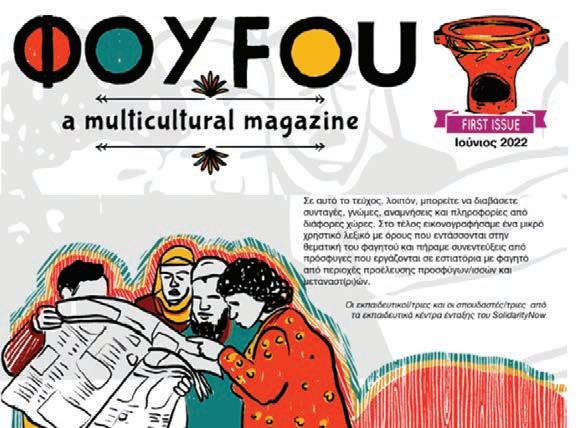
Four girls talk about painting and learning, on the occasion of the International Day of Education on January 24th
The 15-year-old girls Mohadesa, Sezara and Muzhda from Afghanistan live in the open accommodation site for refugees and asylum seekers in Ritsona and 18-year-old Roya in the site in Thebes. The four of the are beneficiaries of the organisation’s “Homework and Creative Activities Centers”
operating in both places.
They are united by painting. They came to Greece with their families looking for opportunities for a decent life and started to unfold their talent here, finding the right supportive environment. In the tribute, they talk with enthusiasm and dreams about painting, about women’s rights and about the freedom they experience through art. The tribute’s aim was to highlight the multiple benefits of children’s access to education.
Click

“Two years ago, I was like most people who praise art. I knew only a little about painting. But now I am that person who others praise his art”, Mohadesa
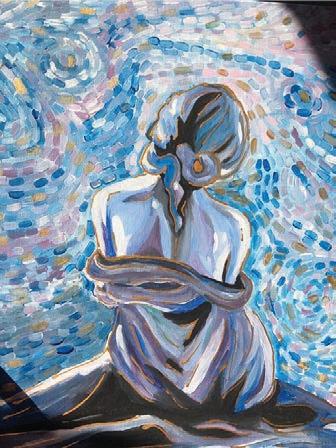
“When I paint, I feel like a queen who instructs her hands to scatter color and her mind to focus on something and then the two together make me the happiest person at that moment. I am like a leaf dancing in the air”, Muzhda
Click
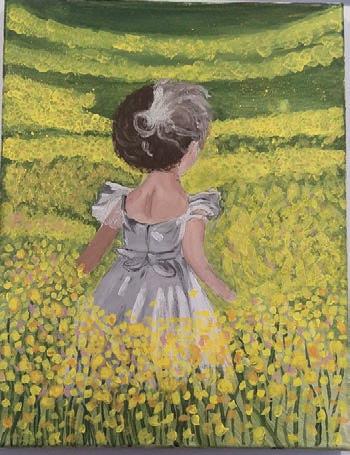
“I paint, because that way my mind forgets the bad things. With painting I can feel good”, Sezara
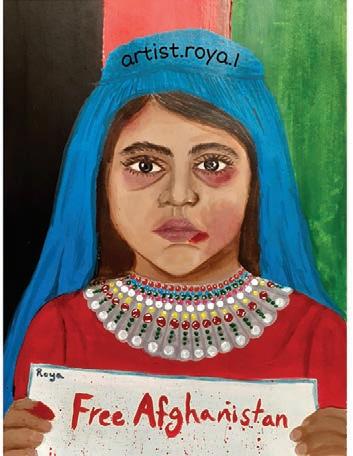
“I like to paint because it makes me feel free. I want to talk to the world! I have a lot to say! To tell about what I feel, to talk about the women in Afghanistan who have a voice but cannot be heard. To be heard through me and my paintings!”, Roya
8 May 2022
With these photographic snapshots the mother from all corners of the earth was honoured. Madlin and Hezrin from Syria, Khaleqi and Nafesa from Afghanistan, Zahra from Iraq, Narmeen from Egypt and Yana from Ukraine. These seven mothers left their countries in search of safety, peace and a better future for their children. In the photos we see them in happy moments strong and proud with their children.
Click
An online tribute to friendship, on the World Friendship Day, July 30th. Eight stories of friendship among beneficiaries of the programs “All Children in Education”, “Female Friendly Spaces “ (HARP program) and HELIOS, from five different sites (Andravida, Diavata, Nea Kavala, Thebes, Vagiochori) and Ioannina.
Click
What is the impact of education on the lives of children, their parents and teachers? Students of the “Homework and Creative Activities Centers”, parents and teachers in six out of the twelve locations in the country where the Centers operate, give their answers.
Participants include Iliana, Louisa, Shevin, Mr. Ali, Elpida, Basira, Maria, Ramazan, Ms. Sabrmha, Harris, Badal, Iqbal, Chrysa, Hasti, Kosar and Alexandra! Click
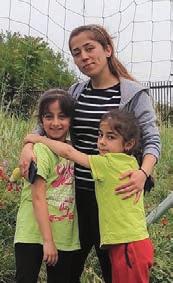
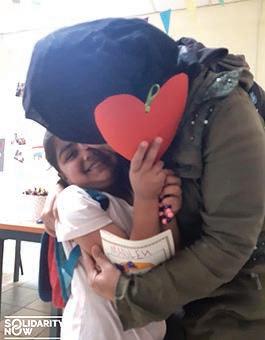
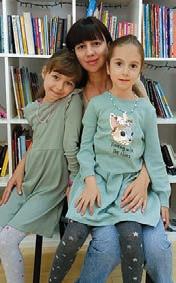
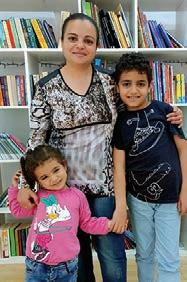
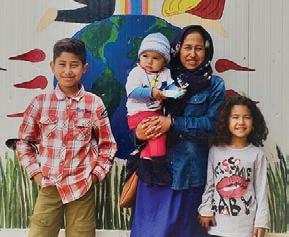
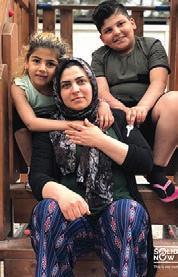
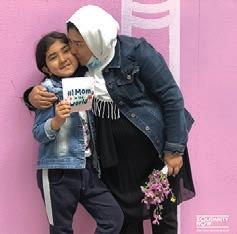
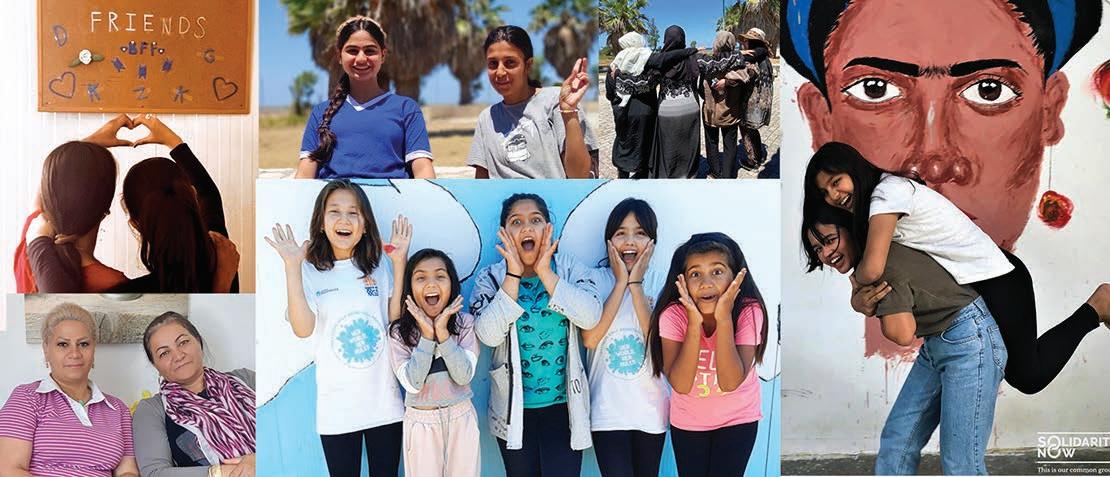
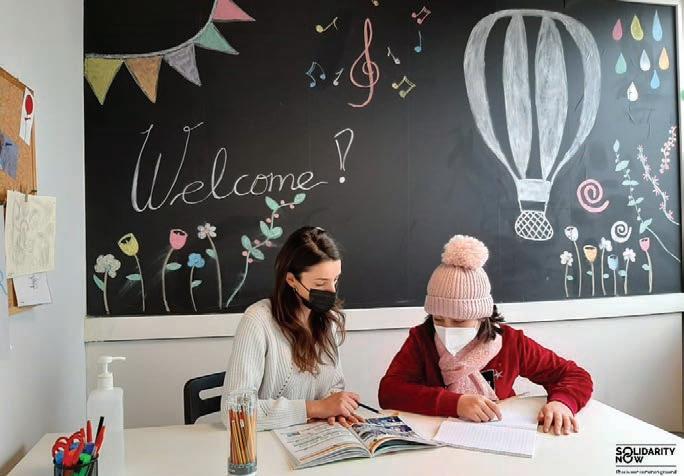
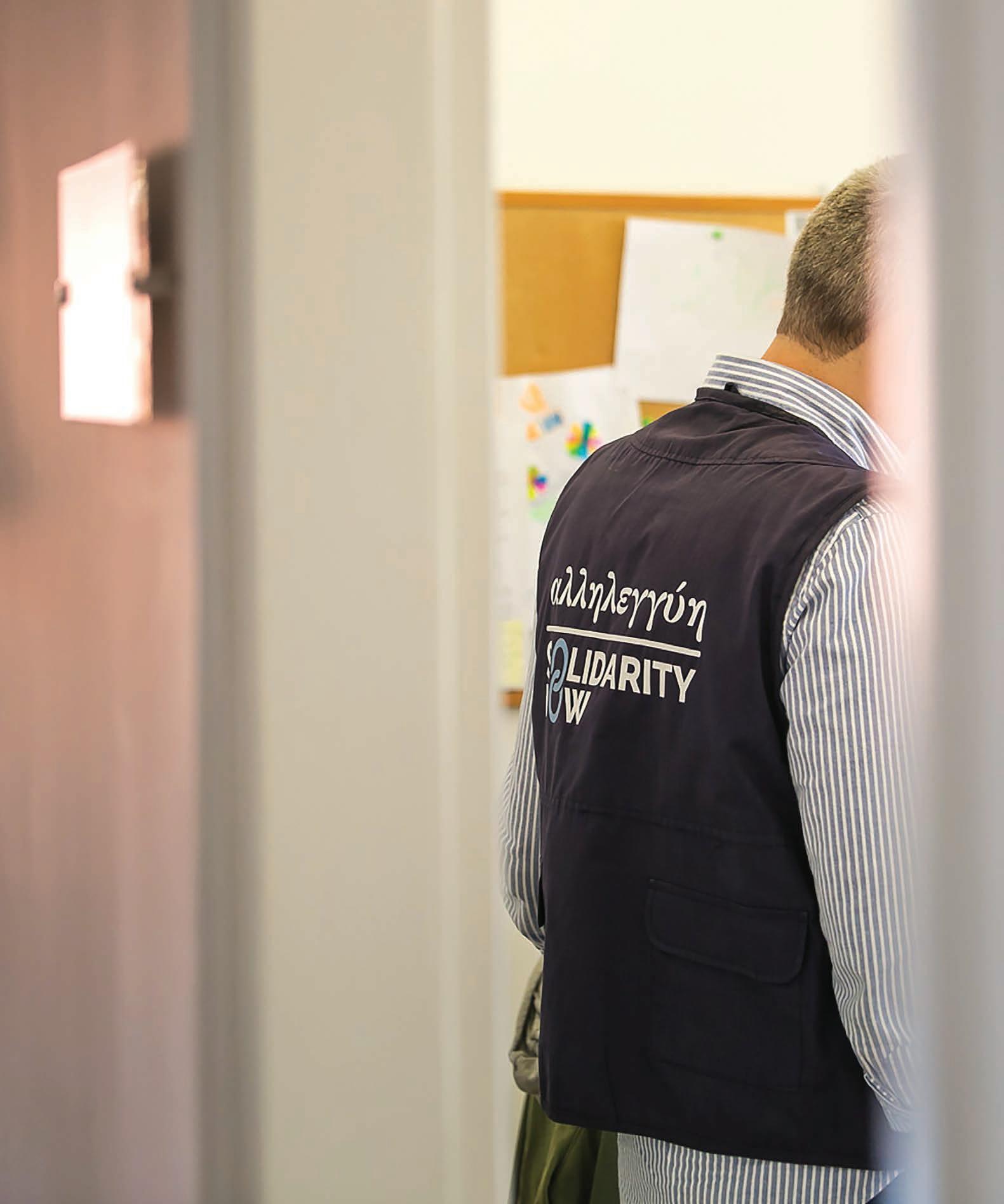
Zavvos Stelios, Chairman
Alivizatos Nikos, Honorary Professor of Constitutional Law – University of Athens
Vidalis Efthimios, Vice-Chairman, Businessman
Diamandouros Nikiforos, Honorary Professor of Political Science – University of Athens, first National Ombudsman of Greece and Ombudsman for the European Union
Doxiadis Aristos, Partner, Venture Capital Investor
Cavounidis Jennifer, Senior Research Fellow – Center of Planning and Economic Research, Visiting Associate Professor, Athens University of Economics and Business
Boutaris Yiannis, Businessman, Chemist, Oenologist, ex-Mayor of Thessaloniki
Nomikou Calypso, President of A.M. Nomikos Transworld Maritime Agencies S.A.
Rozakis Christos, Professor of International Public Law – University of Athens, Vice President of the European Court of Human Rights
Marilyn Polena, General Manager
Fay Koutzoukou, Deputy General Manager
Ioanna Fourkiotou, Regional Director for Northern Greece
Lily Sklavi, Finance Director
Nicholas Rangos, Senior Programs’ Manager
Marina Kanta, Senior Lawyer & Advocacy Manager
Valia Savvidou, Communications Manager
Panos Lioukas, Head of Accounts
Sofia Gkarane, Human Resources Manager
Nafsika Wagger, Monitoring, Evaluation & Accountability Manager
Sotiris Perperidis, Procurement & Logistics Manager
Lefteris Antoniadis, IT Manager
Valia Andrakakou, Athens Solidarity Center Coordinator
Katerina Goula, Program Officer Active Citizens Fund
Mary Asvesta, Employability Project Coordinator
Giorgos Tsitiridis, Roma Officer
Lina Theodorou, Legal Aid Project Coordinator
Zoi Triantafyllidou, Female Friendly Space (FFS) Project Coordinator
Eva Mellou, Project Area Manager (S. Greece)-“All Children in education” program
Dora Seitanidou, Project Area Manager (N. Greece)-“All Children in education” program
Giorgos Tsouros, Child Protection Expert
Athanasia (Nancy) Papiggi, Volunteers’ Coordinator
ABBASNEJAD SABER
ABDALLA MOUSTAFA
ABDOLRASHIDI NASIMEH
AHMADI AMIN
AHMADI MELAD JOHN
AHMED RAIS
ALHAQQ MONA
ALSINDI FARHAD
ARAFA KHALED
ARAGAO BARRETO DA CUNHA GABRIELA
AZIZIRAD MOHAMMAD-ALI
BAH ANGYE
BAHRAMI RAMIZ
BARRY MAMADOU MOUSSA
BOUILA MASSINSA OLIVE ROY
BUZA MARGARETA
CHAMANI MOHSEN
DADJOU MERSEDEH
DAWOUDI AKEFA
DENISENKO GENNADIY
DERISAVI ALI
DUBERET EFI
ELFDALI KAREEM ALAA MOSTAFA ABDOU FEDHILI IMEN
GHAFOORIAN SARA
GHASEMI ZAHRA
GHAZNAVI ROZIKHAN
GOTH SIGURD CHRISTIAN
HABIB NAJIBOULLAH
HAIL PIANO
HAJ YOUNES BARSHANK
HALLAK NADWA
HAMIDA AHMED
HASANI KHAIRULAH
HOSSEINI HAWA
HUSSEINI MARJAN
KAKAR HAZRATULLAH
KARAK MOHAMADI
KARIMI AMIR
KHALILI BAHMAN
KHATIBZADEHYAZDI SEYEDAMIRAHMAD
KHOSHRAFTAR MASOUMEH
KLIUS MYROSLAVA
KOHESTANI RUQIA
KOSYTSKYY MYKOLA
LADAA IYAD
MALA IBRAHIM DAHSHTI RASHID MAJEED MALEKZADA FARZAD
MOHAMED MOHAMED
MOHAMMADI HUSEIN
MOPOUA KADIJA
MUENABANTU-ILUNGA ZACHARIE
NOVIKOVA OLEKSANDRA
OMAR SHERZAD
OMARZADA OMIDULLAH
PJETRAJ TONIN
QURAISHI AHMAD SEYAR
RAHAT KHOSAL SHAFIQULLAH
RAYATI ALI
REZAI ZIA
SEVERIN TCHOGNA NJAMEN
SOFRONOVA MAIIA
TORKJAZI MAHDI
UOSOFI ALI
VAZIFEH SHENAS ZAHRA
YEGANENIA MILAD
YETKINER ERGUN
ZAVVOS ALEXANDRA CHRISTINE MARIE
AVRAMIDOU SOUMELA
AGORASTOS ALEXANDROS
ΑΖΑΜΙ MARIAM-KATERINA
AZOUG FARIDA
ATHANASIOU CHARA
AL IMADI NADINE
ALEKSIOU KATERINA
ALSOUKI JASMINE
AMANATOPOULOU THALIA
ABDEL SAHID GIORGOS
ANAGNOSTOPOULOU ALEXANDRA
ANASTASIOU VASILIKI
ANDRAKAKOU VASILIKI
ANTONIADIS LEFTERIS
AOUAD ANASTASIA
APERGI FOTINI
ARABATZI VASILIKI-ARETH
ARONIS KONSTANTINOS
ASVESTA MARIA
ASIMAKI MELPOMENI
AHMED MIRXAS
VAGGER NAFSIKA
VAGIAKIS GIORGOS
VARVARIOTIS ASTERIOS
VARTHALAMI MARIZA
VASILAKOU EVAGGELIA
VASILIADOU ANTIGONE
VASILIOU CHRISI-SOFIA
VAFIADI EVAGGELIA
VELALI ALEXANDRA-ANNA
VELENTZA VASILIKI
VERGOU ELENI-MARIA
VLASOPOULOU AGGELIKI
VLAXOU GEORGIA
VOLIOTI MARAGKOU ELENI
VOULGARIS KONSTANTINOS
VOULDOUKI MARIA
VOUTSARIDI LIDA
GAVRIELATOU MARIKA
GAZI NERMINE
GAITANOS VAGGELIS
GERAKITIS KONSTANTINOS
GEROXRISTODOULOU PANAGIOTIS
GEORGIOU PANAGIOTA
GEORGOPOULOU MELPOMENI
GEORGOPOULOU DOMNIKI
GIAZITZI VASILIKI
GIAMALI VASILIKI
GIANNAKAKI EFSTRATIA
GIANNAKOPOULOU ANASTASIA
GIANNATSIS PANTELIS
GIANTSIDIS IOANNIS
GIATROUDI XARA
GIAXMAXAN XERETIN
GKARANE SOFIA
GKATZELI EVAGGELIA
GKELIS MICHAIL
GKERGKIS PANAGIOTIS
GKIZERIS TASOS
GKOLFOU EVAGGELIA
GKOSIOU ALEXANDRA
GKOUSIAS CHARALAMBOS
GOULA KATERINA
GOURNA STAMATIA
GOUSIAS GIORGOS
DALAMPOURAS NIKOLAOS
DARIVIANAKIS ADAM
DELVOIS PANAGIOTIS
DELIGIANNI ZOE ANNA
DIMADI PARASKEVI
DIMITRIOU PANAGIOTIS
DIAMANTOPOULOU IRENE
DIONALLIS VASILIS
DOTSA CHRYSOULA
EL SAYED AZZA
EVAGGELATOU GEORGIA NEKTARIA
EFTHIMIOU GIORGOS
EFSTRATOUDAKIS IOANNIS
ZARZOU VASILIKI
ZEIS THEODOROS
ZIZOPOULOU CHRYSA
ZITI PELAGIA
ILIOPOULOU GLYKERIA
THEORODOU AGGELIKI
ISMAEL IBRAHIM
KAIRI AGGELIKI
KALOMIRIS NIKOLAOS
KALTSIDOU GEORGIA
KALTSIDOU ELENI
KANTA MARINA
KARAVAGGELIS CHRISTOS
KARAVASILI MARGARITA
KARATHANASI AGGELIKI
KARAKOSTAS GIORGOS
KARANTANA KATERINA
KARAPETI AGGELIKI
KARATZOGIANNI VANA
KARVELA ILIANA
KASEM HASSAN
KASKARIKA MARIA
KASSAS PASCHALIS
KATELANAKI EFTIXIA
KATI KALLIOPI
KATSIKARI MARIA
KATSIKARIS GIORGOS
KATSILIS VASILIS
KENTROU ALVISA
KIOURKTZIAN MARAL
KIRLAS MARIOS
KOLIOPOULOU ELEFTHERIA
KOLOTSIOS EVAGGELOS
KOMNINOU DORA
KONDILIS GIANNIS
KONTARINI HLEKTRA
KONTOGIANNAKIS GIANNIS
KONTOU ELENI
KOSMIDOU MIKROPOULOU KATERINA
KOTOPOULI KONSTANTINA
KOTSIKARI PANAGIOTA
KOULIOPOULOU PASCHLIA
KOULOURI ATHINA
KOULOURI LYDIA
KOUTZOUKOU FAY
KOUTSANDREA ELENI
KOUTSOGOULAS LEFTERIS
KOUTSOUBA DIMITRA
KOCHILA THEODORA
KRITIKOU ELPIDA
KIRIAKIDOU ANTHI
KYRIAKOU KATERINA
KONSTANTINIDIS ISAAK
KOSTIKIDIS CHRISTOS
LAINA KATERINA
LABADARI ANTONIA
LAFAZANI MARIA
LEGGA OLYMPIA
LEONTARI VIRGINIA
LEONTIADOU PARASKEVI
LIANZAKIS PARASKEVAS
LIOSIS CHRISTOS
LIOUZA KONSTANTIA
LIOUKAS PANOS
LYBERAKI ANTIGONE
LOLI ANISA
MANOU PANAGIOTA
MANTZIKOU STELLA
MANOLAKOS PANAGIOTIS
MANOLIAS VLASIS
MAOUTSIDOU MARIA
MARIOLI KALLIOPI
MATSOUKA ANASTASIA
MAVRIDOU THEODORA
MAVRIDOU MARIA
MAVROMOUSTAKI IRENE
MELLOU EVA
METAKSA SOFIA
MITSIKARI STAVROULA
MICHALOU IRENE
BAZOUKA ARGIRI
BAKALI ASIMINA
BAKAS DIMITRIS
BAKSEVANOGLOU GEORGIA
BATSILA GLYKERIA
BELESI ATHINA
BENTAI LORENA
BISBIKI ARISTEA
BITOUNI MARKELA
BITOUNI ROELA
BOGEAS THEO
BOLETSI AGGELA
BOUZI-FILIPPIDI STAVROULA
BOUBOPOULOU ANASTASIA
BOURGAZAS PANAGIOTIS
BOURBOU CHRISTINA
BOUSAKI KATERINA
MILONA THEODORA
MORALI THEOFANO FANI
NAKKAS NIKIFOROS NIKITAS
NAXOPOULOU ATHINA
NEPIENLIDOU MARIA
NIKITA KIRIAKI
NIKOLAIDIS ALEXANDROS
NINOU MARIA
DARGARAS CHARALAMBOS
DOUMANI IOANNA
DREU DORINA
XINOS PANAGIOTIS
OIKONOMOPOULOU ANNA MARIA
OIKONOMOU ELENI-STILIANI
OIKONOMOU MARIA
PAGIATI MARIA ELENI
PALAGA OLGA
PALASKAS NIKOS
PALIANOPOULOS NIKOS
PALIOTZIKA EFSTATHIA
PANAGIOTAKOPOULOU ZEINA
PANAGIOTAKOPOULOU ELENI
PANAGIOTOPOULOS ATHANASIOS
PANTAZOPOULOU THEODORA
PANTOU CHRISTINA
PAPAGEORGIOU ELENI
PAPAGEORGIOU ANASTASIA
PAPAGRIGORIOU PAPAKOSMIDOU KIRIAKI
PAPADOPOULOU VERA
PAPADOPOULOU CHRISTINA
PAPAKONSTANTINOU EVAGGELOS
PAPAKONSTANTINOU KATERINA
PAPANIKOLOU PANAGIOTA
PAPAPASCHOS VASILEIOS
PAPIGGI ATHANASIA
PAPOULIA MARIA
PAPPA VASILIKI
PARADISOU CHRISTANTHI
PARASKEYOULAKOU ALEKSIA
PASCHALIDOU STILIANI
PATLIAKA SOULTANA
PATRIKIOS NIKOLAOS
PATSI MARIA
PERIKLEOUS VASILIS
PERPERIDIS SOTIRIS
PETRIDOU MARIA
PLATANISIOTI IOANNA
POLENA MARILYN
POULIKIDIS CHARALAMBOS
POUBOURIDI PANAGIOTA
PRODROMIDOU MYRTO
RAGKOS NIKOLAS
RAFAILIDIS SOKRATIS
ROUSOMANI LOULOUDA
ROUSTA SOFIKA
SAVVIDOU VALIA
SAKELLARIOU ALEXANDROS
SAKELLARIOU KYRIAKI
SANNAS DIMITRIS
SARIDOU EFTIXIA
SEITANIDIS ANASTASIOS
SEITANIDOU THEODORA
SIMATIS PAVLOS
SIASIOU ALEXANDRA
SINANI IOANNA
SIRETI AGGELIKI
SKLAVI LILY
SKOUMA ALEXANDRA
SKRETAS KONSTANTINOS
SPILIOPOULOS GRIGORIS
STATHOPOULOU VASILIKI
STAMELOU KATERINA
STAVRAKAKI VIRGINIA
STAVROPOULOU ATHINA
STERGIOUI SOFIA
SIKARI VIOLETTA
TANNI MARIA
TASIOUDIS ORESTIS
TASIOUDIS ORFEAS
TATSOUDI KYRIAKI
TZAVELLA ALEXANDRA
TZEGIOUSI ΡΙΜ
TZELEPI SOFIA
TZIBELEKI PARASKEVI
TZIMOULA EFTHIMIA
TZIRAKI ANTONIA
TOUMAZATOU EFROSINI-AIKATERINI
TRIADAFILLIDOU ZOE
TRIFEROPOULOU ATHINA
TSAVALAS STILIANOS
TSALAMANDRIS GIORGOS
TSAMI DIMITRA
TSANANA MARIA
TSATSARONI ELENI
TSELIOU ATHINA
TSENEBI ELENI
TSILKIAS FOIVOS
TSIBRIS VASILIS
TSITIRIDIS GIORGOS
TSITROPOULOU CHRYSOULA
TSOUROS GIORGOS
FLOROS GIORGOS
FOURKIOTOU IOANNA
FOURLI MARIA ANNA
CHAIDEMENOS IOANNIS
CHANTZIDOU MARIA ELENI
CHARITOU IRENE
CHASAPIDOU OURANIA
HATS KASSEM OMAR IOSIF
CHATZIKIRIAKOU ZAKLIN
CHATZOUDI KONSTANTINA
CHERAKI RITA
HESME SAMUEL
CHOKMETIDOU NIKOLETA
CHOLEVA DANAE
CHRISTAKI IOANNA
CRHISTOU CHRISTINA
CHRISTIDOU MELPO
CHRISTOPOULOU MARIA VASILIKI
CHRISTOFILIS OTHON GIORGOS
CHRISOULA THEODORA
PSILOPANAGIOTIS KONSTANTINOS
During 2022, SolidarityNow’s volunteer pool expanded to incorporate new collaborations, higher participation and a more structured way of managing the volunteer network. The beginning of 2022 brought the first in-person voluntary activities both in SN’s Centers as well as in the accommodation sites in Northern and Southern Greece. The volunteers and interns worked to support the educational teams and social services, designing and implementing psychosocial activities, managing administrative work, working to empower women, and helping with interpretation in various settings. Establishing structure
SN’s recruitment procedure for volunteers and interns was finalised, harmonising practices across different programs. An online drive was created and made available throughout the organisation, including a recruitment guide, all relevant documents, two guides for volunteers and volunteer coordinators, and the trainings that were designed for welcoming new volunteers. Following the harmonised process, all volunteers and interns are now trained on their first day, and many receive further training for their specific position. In the below diagram, the volunteers’ pathway in SN is outlined:
During 2022, SolidarityNow collaborated with different key networks to develop its volunteer pools:
1. Scouts of Greece: SN’s volunteer coordinator presented the organisation’s humanitarian work to the 1st Scouts Group of Peristeri in Athens, raising awareness on vulnerable groups. The presentation spurred a collaboration with the Scouts of Greece, who organised an online presentation about protection from natural disasters to beneficiary
children of various accommodation sites. Due to the activity’s success, the communication between SN and the Scouts of Greece remains open for future collaborations.
2. Colleges and Universities: Different colleges around Greece reached out to SN for possible collaborations, giving rise to active volunteer pools arose in collaboration with Deree College in Athens, the American College of Thessaloniki, the International Center for Hellenic and Mediterranean Studies (DIKEMES), City College, and Mediterranean College. Our collaboration with the Mediterranean College was more formally established through an MoU, whereby the College agrees to offer, among others, internships for SN beneficiaries, as well as tuition discounts. Greek, Italian, French and Danish universities (Institut d’ études politiques de Τoulouse, VIA University College, Università degli Studi di Padova, Université Catholique de Lille, among others) also directed students to SN’s volunteer network, with interns and volunteers performing duties including working with children, providing administrative support, and organising educational activities. Students from Greek universities also joined our network, mainly from the Hellenic Greek University (EAP), University of Patras, Aristotle University, University of Ioannina, and the National and Kapodistrian University of Athens.
3. ThessDiktio: In 2022, SN became a member to the Network of Volunteer Organizations of Thessaloniki / ThessDiktio. We were especially active on the International Volunteer Day, providing a relevant workshop for volunteers in the Blue Refugee Center, featuring storytelling, interactive activities, and open discussions, and participating in the open event in Thessaloniki’s port.
4. CHEERing and AMURTEL: SN also collaborated with the Indian NGO Ananda Marga Universal Relief Team, Ladies (AMURTEL) and the European NGO CHEER International Greece (CHEERing) in Northern Greece. Volunteer midwives advised women on breastfeeding and parenting inside the accommodation sites of Northern Greece. “CHEERing” also offered football lessons to children between 6 to 15 years old.
5. Hellenic Olympic Committee: Volunteers from the Hellenic Olympic Committee provided educational sports lessons to children between 7 to 17 years old in Northern Greece, including football, judo and more; one of the aims of these activities was to cultivate the spirit of sportsmanship and healthy competition among children.
6. International Program Windows on the World: The project organised by the University of Edinburgh took place in the accommodation sites of Ritsona and Oinofyta, performing arts workshops featuring music, songs, dancing, and theatre, enhancing children’s selfexpression and interpersonal skills.
7. Global Contact MS ActionAid Denmark: SN signed an MoU with Global Contact MS ActionAid Denmark for future volunteering actions and internships in collaboration with
Danish Universities. The main objectives are, among others, to create an intercultural exchange and break down prejudice between different cultures and improve the knowledge and understanding of living conditions in other parts of the world.
8. Solidarity Café: SN collaborated with professors from Aristotle University and Belgian academia, inviting volunteers and beneficiaries for open conversation clubs inside the University, promoting peer-to-peer language learning and fostering cultural exchange between over 60 participants.
9. Global Women’s narratives projects by the Oxford’s Initiative: Students from the University of Oxford attended workshops featuring female refugees’ own narratives, followed by open discussions organised by SN staff in Athens and Thessaloniki. Their visit was very emotional for both sides, exchanging stories and experiences.
10. Workshops by beneficiaries to support the volunteer network: Α refugee woman from BRC provided an interactive workshop to student beneficiaries on dental health, while a Ukrainian refugee supported the Ukrainian community utilising BRC’s facilities for a workshop on social media use and promotion.
In 2022, the following milestones were achieved through our volunteer activities:
225 new volunteer & intern applications
121 active volunteers
(most belong to the 18-25 age group)
Volunteers & interns originated from: Denmark Ecuador Egypt Germany Greece Ireland Italy Lebanon Malaysia Poland Portugal Stateless Switzerland Syria Turkey Ukraine UK USA
With the initiative of SolidarityNow, independent auditing by Ernst & Young Hellas is carried out and the results are published at www.solidaritynow.org. At the same time, SolidarityNow is also being audited by certified auditors for every grant received.
Allocation of Expenses
Donors
Statement of Financial Position
Statement of Total Comprehensive Income
To the Members of the Non-Profit Association “SOLIDARITYNOW”
Report on the Audit of the Financial Statements
Opinion
We have audited the accompanying financial statements of Non-Profit Association “SOLIDARITYNOW” (the “Association”), which comprise the statement of financial position as of December 31, 2022, the statements for total comprehensive income and the statements of changes in equity and cash flows for the year then ended and a summary of significant accounting policies and other explanatory information.
In our opinion, the accompanying financial statements present fairly in all material respects the financial position of Non-Profit Association “SOLIDARITYNOW” for the year ended December 31, 2022 and its financial performance and cash flows for the year then ended, in accordance with International Financial Reporting Standards (“IFRS”) as endorsed by European Union.
Basis for Opinion
We conducted our audit in accordance with International Standards on Auditing (ISAs), as incorporated in Greek Law. Our responsibilities under those standards are further described in the “Auditor’s Responsibilities for the Audit of the Financial Statements” section of our report. We are independent of the Association in accordance with the International Ethics Standards Board for Accountants’ Code of Ethics for Professional Accountants (IESBA Code), as incorporated in Greek Law, together with the ethical requirements that are relevant to the audit of the financial statements in Greece, and we have fulfilled our ethical responsibilities in accordance with these requirements and the IESBA Code. We believe that the audit evidence we have obtained is sufficient and appropriate to provide a basis for our opinion.
Management is responsible for the preparation and fair presentation of the financial statements in accordance with International Financial Reporting Standards as endorsed by the European Union, and for such internal control as management determines is necessary to enable the preparation of financial statements that are free from material misstatement, whether due to fraud or error.
In preparing the financial statements, management is responsible for assessing the Association’s ability to continue as a going concern, disclosing, as applicable, matters related to going concern and using the going concern basis of accounting unless management either intends to liquidate the Association or to cease operations, or has no realistic alternative but to do so.
Auditor’s Responsibilities for the Audit of the Financial Statements
Our objectives are to obtain reasonable assurance about whether the financial statements as a whole are free from material misstatement, whether due to fraud or error, and to issue an auditor’s report that includes our opinion. Reasonable assurance is a high level of assurance but is not a guarantee that an audit conducted in accordance with ISAs, as incorporated in Greek Law, will always detect a material misstatement when it exists. Misstatements can arise from fraud or error and are considered material if,
individually or in the aggregate, they could reasonably be expected to influence the economic decisions of users taken on the basis of these financial statements.
As part of an audit in accordance with ISAs, as incorporated in Greek Law, we exercise professional judgment and maintain professional scepticism throughout the audit. We also:
• Identify and assess the risks of material misstatement of the financial statements, whether due to fraud or error, design and perform audit procedures responsive to those risks, and obtain audit evidence that is sufficient and appropriate to provide a basis for our opinion. The risk of not detecting a material misstatement resulting from fraud is higher than for one resulting from error, as fraud may involve collusion, forgery, intentional omissions, misrepresentations, or the override of internal control.
• Obtain an understanding of internal control relevant to the audit in order to design audit procedures that are appropriate in the circumstances, but not for the purpose of expressing an opinion on the effectiveness of the Association’s internal control.
• Evaluate the appropriateness of accounting policies used and the reasonableness of accounting estimates and related disclosures made by management.
• Conclude on the appropriateness of management’s use of the going concern basis of accounting and, based on the audit evidence obtained, whether a material uncertainty exists related to events or conditions that may cast significant doubt on the Association’s ability to continue as a going concern. If we conclude that a material uncertainty exists, we are required to draw attention in our auditor’s report to the related disclosures in the financial statements or, if such disclosures are inadequate, to modify our opinion. Our conclusions are based on the audit evidence obtained up to the date of our auditor’s report. However, future events or conditions may cause the Association to cease to continue as a going concern.
• Evaluate the overall presentation, structure and content of the financial statements, including the disclosures, and whether the financial statements represent the underlying transactions and events in a manner that achieves fair presentation.
We communicate with those charged with governance regarding, among other matters, the planned scope and timing of the audit and significant audit findings, including any significant deficiencies in internal control that we identify during our audit.
Athens, January 4, 2024
The Certified Auditor Accountant
Konstantinos Tsekas S.O.E.L R.N. 19421
ERNST & YOUNG (HELLAS)
CERTIFIED AUDITORS ACCOUNTANTS S.A.
8B CHIMARRAS ST., MAROUSSI 151 25, GREECE
Company SOEL R.N. 107
STATEMENT OF FINANCIAL POSITION according to the GREEK ACCOUNTING STANDARDS 01/01/2022 - 31/12/2022 (amounts in Euros) ASSETS 1/1/22-31/12/22 1/1/21-31/12/21
STATEMENT OF PROFIT OR LOSS according to the GREEK ACCOUNTING STANDARDS 01/01/2022 - 31/12/2022 (amounts in Euros) 1/1/22-31/12/22 1/1/21-31/12/21
International Organization for Migration (IOM)
UNHCR
European Union (AMIF, Erasmus+)
EEA GRANTS
Ministry of Migration and Asylum
Stavros Niarchos Foundation
Open Society Foundations
Kahane Foundation
IsraAID Germany
Metropolitan Development Agency of Thessaloniki
FOCUS Humanitarian Assistance
STAR UK
Dialectica
Municipality of Athens
SolidarityNow joins forces with national and international organizations, networks and civil society institutions, to support and empower vulnerable populations and strengthen the reach and impact of advocacy and policy initiatives.
Greek and Foreign NonGovernmental Organizations Record of the Hellenic Ministry of Migration and Asylum
SolidarityNow is registered in the Record of the Hellenic Ministry of Migration and Asylum as an organization which is active in matters of international protection, migration, and social inclusion in Greece.
National Registry of Institutions of the Private Sector Non-profit
SolidarityNow is registered in the National Registry of Institutions of the Private Sector Non-profit holding social care services and in the Special Registry of the Volunteering NonGovernmental Organisations of the Greek Ministry of Health and Social Solidarity.
ISO
SolidarityNow implements a
quality management system, in accordance with the ISO 9001 standard.
NGOsource
SolidarityNow has been certified by NGO source as being the equivalent of a U.S. public charity. https://www.ngosource. org/
ECRE
SolidarityNow is a member of ECRE (European Council on Refugees and Exiles, a panEuropean alliance of 90 NGOs protecting and advancing the rights of refugees, asylum seekers and displaced persons. / www.ecre.org
Racist Violence Recording Network
The Racist Violence Recording Network was created in October 2011 to monitor the escalation of hate crimes. / www.rvrn.org
Transparency Register
SolidarityNow joined the Transparency Register platform to contribute to its goals and vision, concerning the answers to core questions such as what interests are being pursued, by whom and with what budgets. The system is operated jointly by the European Parliament and the European Commission. http://ec.europa.eu/ transparencyregister/ PICUM
PICUM, the Platform for International Cooperation on Undocumented Migrants, is a network of organizations working to ensure social justice and human rights for undocumented migrants. https:// picum.org/
International Detention Coalition
The International Detention Coalition (IDC) is a unique global network, of over 300
civil society organisations and individuals in more than 70 countries. / www.idcoalition.org
Thessdiktio
The main goals of the network are to strengthen collaboration and networking at a local and regional level, facilitate the exchange of ideas and good practices, and the promotion of the value of voluntarism and active participation in social actions. http://www.thessdiktio. gr/?lang=en
Select Respect Network
The network contributes to the formation of an open society with respect for human rights and the acceptance of diversity at all levels of social and political life. https://selectrespect.org/ network/
Accountable Now
SolidarityNow is a member of Accountable Now, a global platform that supports civil society organisations (CSOs) to be transparent, responsive to stakeholders and focused on delivering impact. http:// accountablenow.org
International Human Rights Funders Group
SolidarityNow is a member of the International Human Rights Funders Group, a global network of donors and grant makers committed to advancing human rights around the world through effective philanthropy. / www.ihrfg.org
CIVICUS
SolidarityNow is part of CIVICUS, a global alliance of civil society organisations
and activists dedicated to strengthening citizen action and civil society throughout the world. https://www.civicus.org
FEANTSA is the European Federation of National Organisations Working with the Homeless. It is the only European NGO focusing exclusively on the fight against homelessness. https://www.feantsa.org
Greek Network for Shelter and Housing
The Greek Network for Shelter and Housing was founded in 2010 by twenty social and public organizations that help fight homelessness in Greece, support socially excluded groups and the homeless and advocate for the right to quality housing for all.
We want to support the most vulnerable members of society, indiscriminately, through new innovative social actions. If you believe in our values and want to support our work BECOME A MEMBER of SolidarityNow!
Visit our website www.solidaritynow.org/en/donation/
Click on “Make a donation” and find out how you can BECOME A MEMBER and join our large, multicultural, and active team!
Any donation -small or big- is important!
For more information, please contact fundraising@solidaritynow.org.
Corporate donations
Corporate Social Responsibility (CSR) is practiced by many companies operating in Greece. The partnerships we seek are financial aid, donations in kind, information, awareness of their employees’ volunteering etc.
Share your precious time
If you are interested in volunteering, contact us at volunteer@solidaritynow.org and we will get back to you so as to explore together the ways that you can contribute to our efforts.
There are many people in need of support, and we need your help to reach out to them.